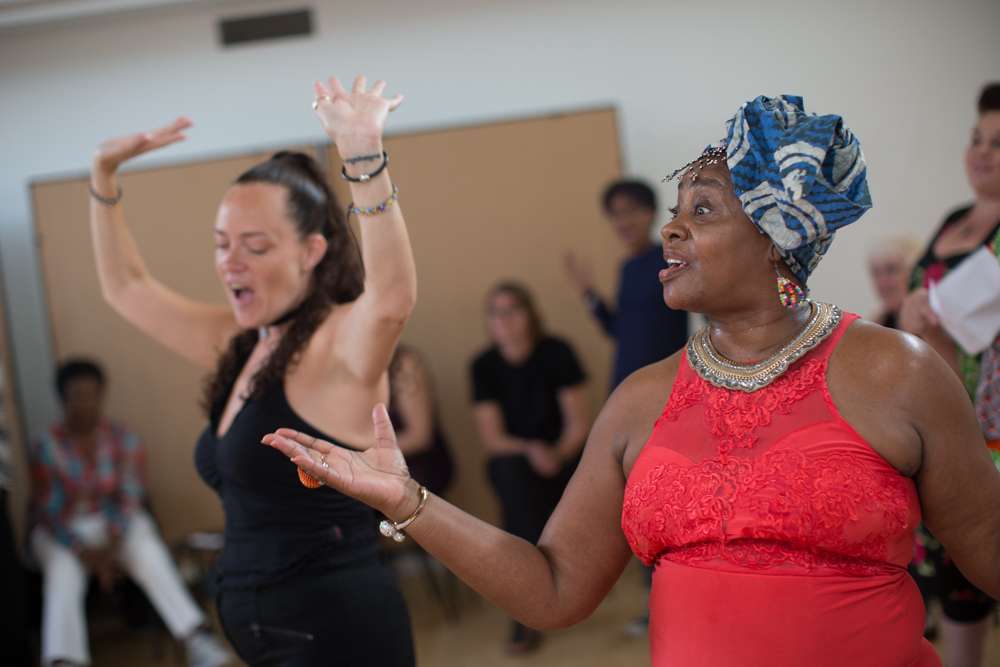
You guessed it - Clean Break is taking part in Big Give’s Christmas Challenge!
For one week only, every donation given to us between 12pm Tuesday 3rd December – 12pm Tuesday 10th December will be DOUBLED.
This year we want to raise £30k – and we need your help.
At Clean Break we have big plans for these donations: we want to deliver empowering theatre and intervention projects for women with lived experience of or at risk of entering the criminal justice system, as well as running workshops in women’s prisons. The money we raise this Christmas will supercharge the impact of our work.
Our work gives women affected by the criminal justice system their voice back. Women who engage with Clean Break’s programs come away feeling more confident, hopeful, and are able to express themselves. They produce vital theatre, and are able to tell their own stories, stories that help their audiences to understand the complex issues faced by women in the criminal justice system, and help to bring communities together.
So every pound you donate, matched by our generous match funders The Reed Foundation UK has the power to give more women a voice, amplify those voices, and bring those them into our theatres and community spaces.
We need your help to reach our target. Remember, whatever you can be generous enough to donate – we’ll get double! And once our brilliant community of supporters have come together and raised £15k, we’ll have smashed our target!
Any amount you can donate will have an amazing impact on our work in 2020.
Keep your eyes peeled on our website and social media on Tuesday 3 December for our Big Give Christmas Challenge launch!
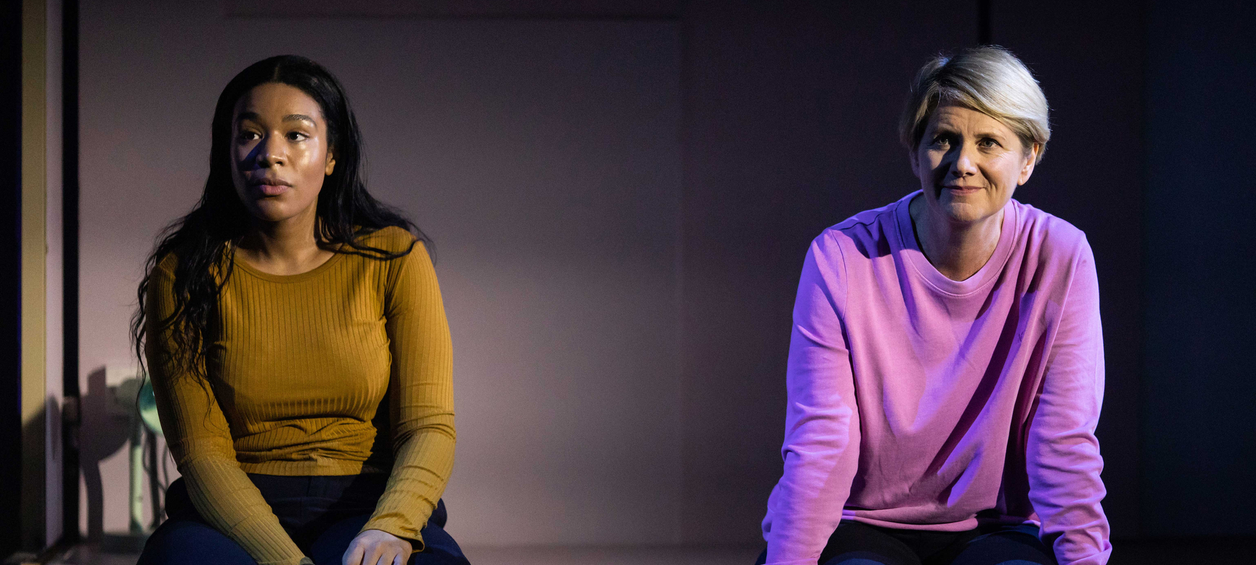
This week’s blog comes from Holloway United Therapies who have shared their thoughts on [BLANK] and explain the parallels between the play and the work they carry out with women with experience of the criminal justice system.
Clean Break’s powerful production of [BLANK] at the Donmar Warehouse perfectly illustrates the need for services such as ours. We’re Holloway United Therapies (HUT), a charity established by members of the former psychotherapy team at HMP Holloway, we provide specialist psychotherapy outside prison walls to women affected by the criminal justice system.
[BLANK] is a series of vignettes encapsulating some of the predicaments that women in the criminal justice system face or have experienced, and that we at HUT encounter in our sessions with our clients. To us, the title of the play suggests the idea of women as nameless statistics within a system, endlessly asked to fill in the blanks on official forms.
The hallmark of Alice Birch’s writing is that she does not shy away from the horror of human interaction, and the reality of cruelty and trauma. When watching [BLANK] for us four scenes stood out for thematic reasons;
When we meet Kate in the opening scene, Arms, she is desperate to communicate her excitement about her new partner, ‘Richard’, whose very name seems more than she can believe or conceivably deserve. She wants to be held in his long arms. She asks her daughter in a later scene, Scar, to confirm that Richard ‘gives good hugs’ but the child is wary. She is used to having to summon up her own defensive weaponry, as her needs have always been subjugated to those of her mother. When someone first comes to therapy, they want to be held symbolically and wonder whether they can trust the support – an authentic containing presence - the therapist is aiming to provide.
In Magnolia, a foster mother sits outside, as she always does, on the last night of a child’s stay, and in sharing a peaceful moment with her foster daughter, she evokes a parallel between her relationship to her charges and that of a gardener to a magnolia tree.
"That’s a magnolia tree ….. It only flowers for one week…. Isn’t that incredible? … You tend to it for a whole year and then it only blooms for a week. … But it’s so so so so beautiful for that week."
Together they are relishing the beauty of the present; but again Birch allows the ugliness to emerge, as the foster mother gives vent to her frustration about the fact that she has tended over time to this child, but that it might be her biological mother, who eventually sees her bloom.
In Carrier Bags two young girls are meeting for the first time in their foster home bedroom. Both girls have brought their own ‘stuff,’ in more than one sense. But they do not wish to be affected by the other’s stuff – not even their name. Children whose boundaries have been violated, constantly test them or seek them out in other less positive ways. This is why the boundaries of therapy, known as the therapeutic frame, are so key.
Salt, the final scene is about a woman trying to make amends for her long absence during her daughter’s childhood. Dissociating from the feelings her guilt and pain bring up for her, the mother tries to share in happy memories. But her adult daughter disabuses her of the reality of the idealized seaside outings. Both characters say ‘OK’ to break silences. But for both, OK is a fill-in for loss – loss of what they can find to say, and loss of all that could have been. It’s as if ‘OK’ is short for ‘out of kilter’ as the two women are so misattuned in their recollection and interpretation of their relationship.
Therapy is about working alongside the client to break down defences that hamper development. Some defences seem inappropriate; yet they may be adaptive and essential to survival in a difficult world. We see our clients for up to a year at HUT and once that time is over, we are left, sharing the feelings of the foster mother in Magnolia, with the uncertainty of not knowing whether the growth we have witnessed in our clients will continue to bloom.
You can find out more about HUT's work here.
[BLANK] runs at the Donmar Warehouse until 30 November click here to book your ticket.
Image Helen Maybanks
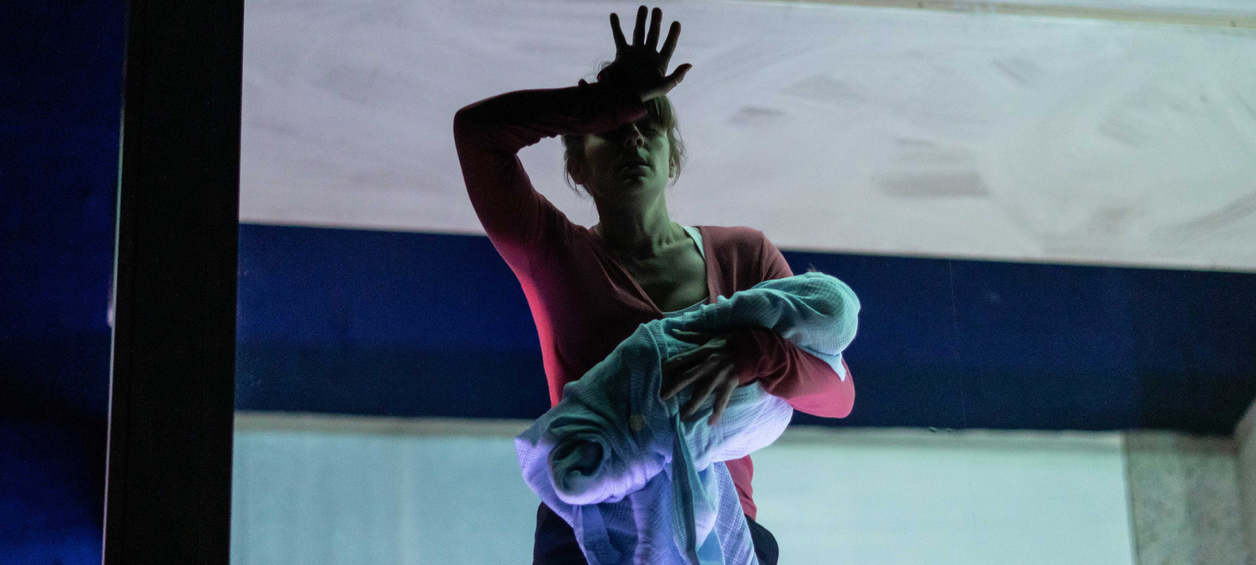
Following on from their visit to [BLANK] Women in Prison share with us their thoughts on the play and how the themes entwine with their #OPENUP campaign.
“It’s a ripple effect isn’t it? We’ve been sentenced but our children have been sentenced with us. It is a struggle.” The preceding words from one woman imprisoned in one of the 12 women’s prisons in England are repeated to us, at Women in Prison, by so many. The experience of motherhood from within prison is often pained with guilt, anxiety and isolation for both the mother and the child left behind on the outside. Nine out of 10 children will be forced to leave their home as a result of their mother’s imprisonment to live with relatives or to go into care. This can have devastating consequences for those children, as well as family bonds which can take a lifetime to repair.
[BLANK] so powerfully showcases this ripple of harm that radiates from the experience of imprisonment, cutting through relationships and severing opportunities to move forward with your life. The play also tells of the complex social circumstances and harmful histories, often rooted within complex family relationships, which chart a course for women to come into contact with the criminal justice system. Childhood abuse and neglect, poverty, domestic violence, mental ill-health, harmful substance use, poverty, inequality are all tightly weaved together to lead you down an inevitable path.
In the UK, we have a chronic overuse of the prison system. Through the decimation of community support, housing, mental health services and refuges, we are now in a position where we, as a society, turn to the police to step in to plug these gaps in services; it is the police who are called in response to someone in mental health crisis or someone who is sleeping on the streets. [BLANK] very clearly demonstrates how all-too-often women feel they have nowhere to turn to – no more room at the domestic violence refuge, too little understanding of post-partum depression, or a family member not equipped to support a daughter’s addiction. Women in Prison has engaged with thousands of women in our prison system who went out and shoplifted just so they could get a roof over their head in prison or so they could escape from a violent partner. Women seek refuge in prison because they have few choices and this comes at great personal risk as imprisonment causes harm to your mental and physical health. Additionally, after prison it will be a greater struggle to find a home or job, your social circumstances and opportunities will have been reduced further.
Women in Prison campaigns to radically reduce the women’s prison population and end the harm caused by prison to women, their families and our communities. Our #OPENUP Manifesto offers 10 solutions to achieve this with investment in community support services and opening up pathways away from criminal justice interventions at its heart.
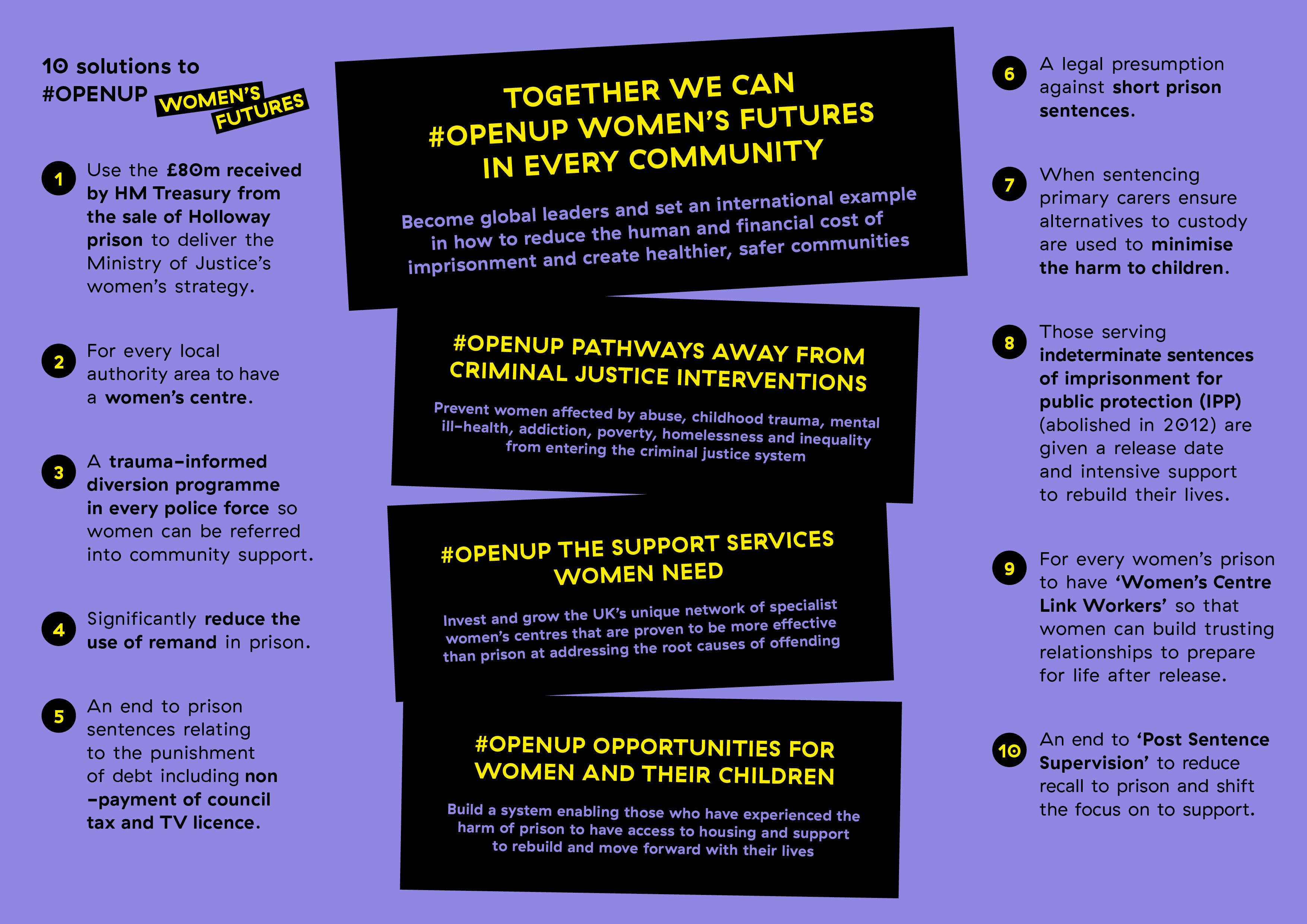
It is little known that the UK is globally unique in having a network of specialist Women’s Centres that provide support for women affected by the criminal justice system. These Centres provide a community for women to come together to support each other, eat lunch, take part in a crafting workshop, or gardening, meditation, knitting as well as find counselling for childhood trauma, support with addiction, mental ill-health, advocacy to find housing or support with parenting, debt advice, CV writing workshop. These Centres are packed with activities and support in an environment that does not judge and does not punish. They enable women to address the root causes that lead to offending and prevent them from coming into contact with the criminal justice system in the first place. But they are also used by the Police to divert women out of the criminal justice system into community support and give Magistrates an alternative to sending individuals to prison. Women’s Centres are proven to reduce offending and enable women to move forward with their lives far more effectively than a prison sentence ever could.
There are around 35 Women’s Centres across the UK, there are many areas of the country that do not have access to this support and the ones that exist need urgent investment to be sustained. Through investment and Government policy that acts on the evidence we have, the very real possibility to achieve something that we can be really proud of and set an international standard in how to reduce the human and financial cost of imprisonment and create healthier, safer communities for all of us. Our vision is for our #OPENUP vision to be delivered so that the [BLANK] of the future is packed with stories of support, opportunities and hope for women and their children.
Claire Cain, Campaigns & Public Affairs Manager at Women in Prison – a national charity that provides support for women affected by the criminal justice system in prison and via women’s centres and campaigns to reduce the women’s prison population.
[BLANK] runs until 30 November at Donmar Warehouse, click here to book your ticket.
Image Helen Maybanks
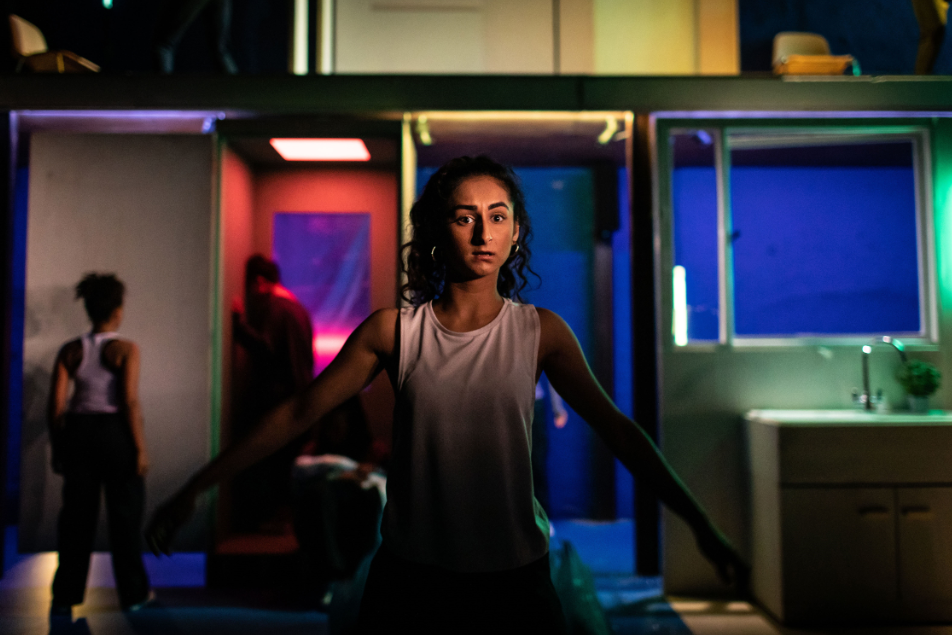
We're delighted to release the first images of [BLANK] our new coproduction with the Donmar Warehouse.
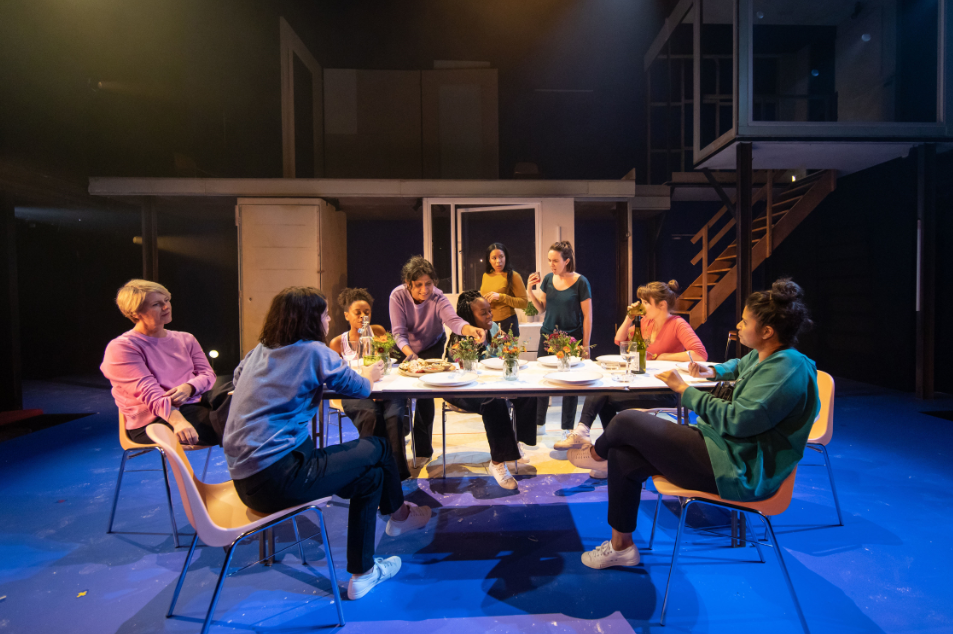
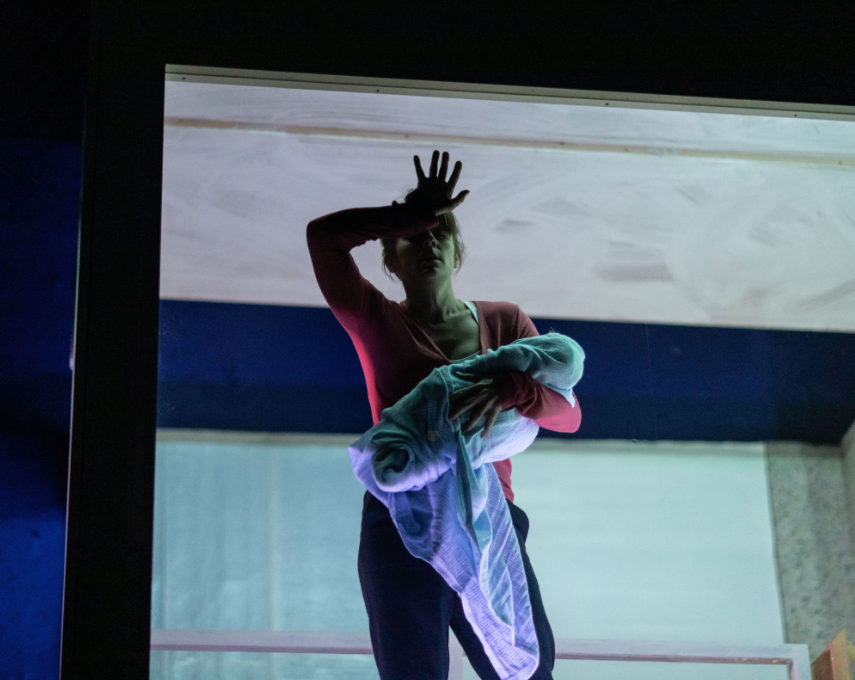
[BLANK] written by Alice Birch is a heartbreaking new play which reaches across society to explore the impact of the criminal justice system on women and their families.
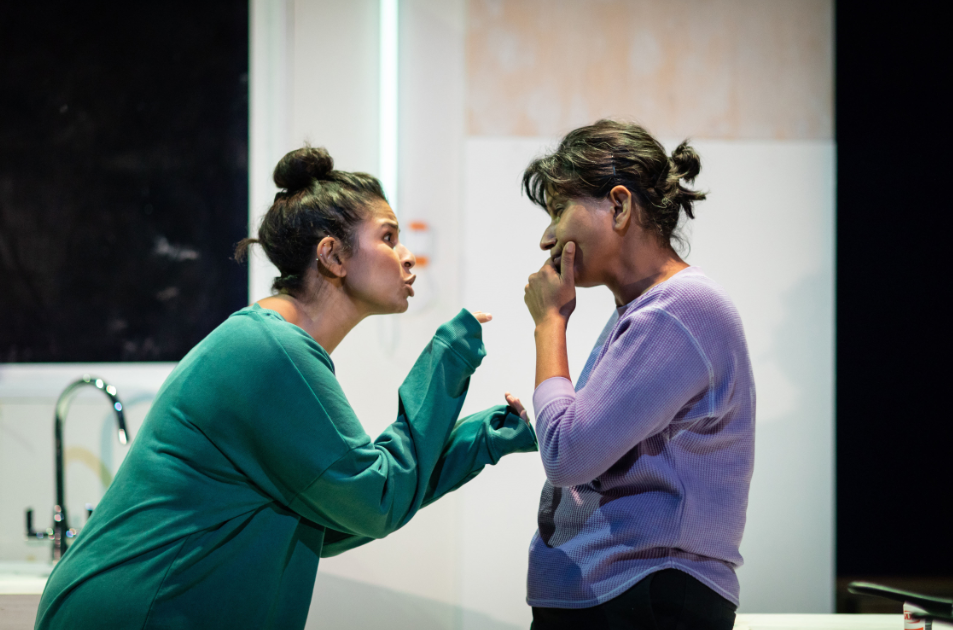
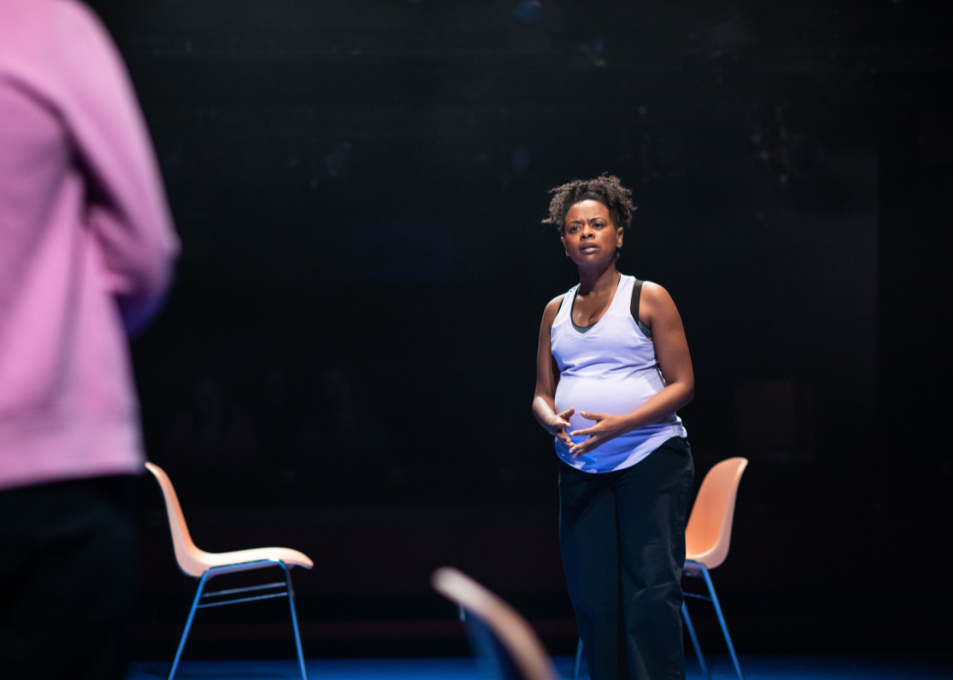
From 100 unnamed scenes, this theatrical provocation challenges the director Maria Aberg to construct an entirely unique production.
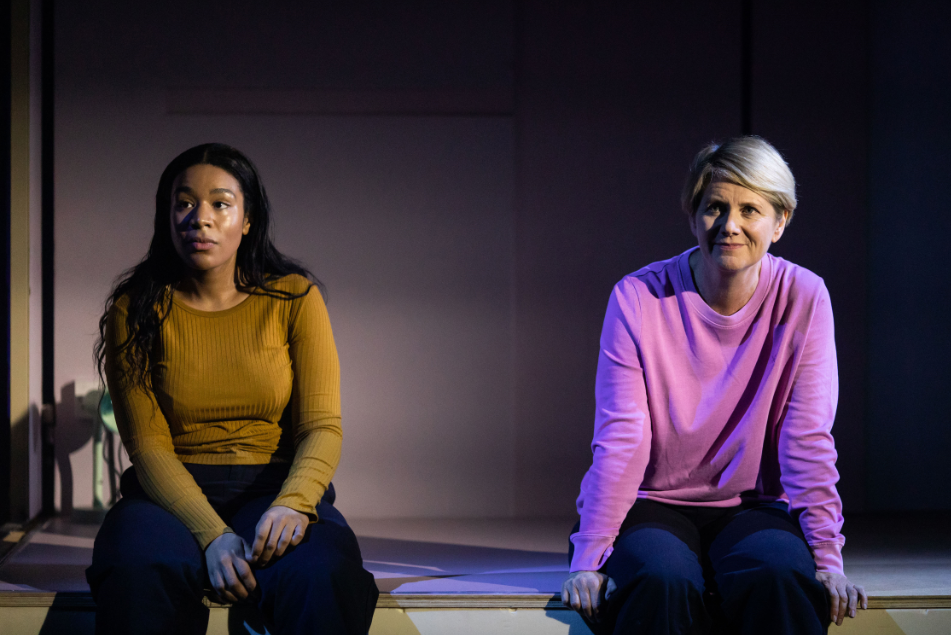
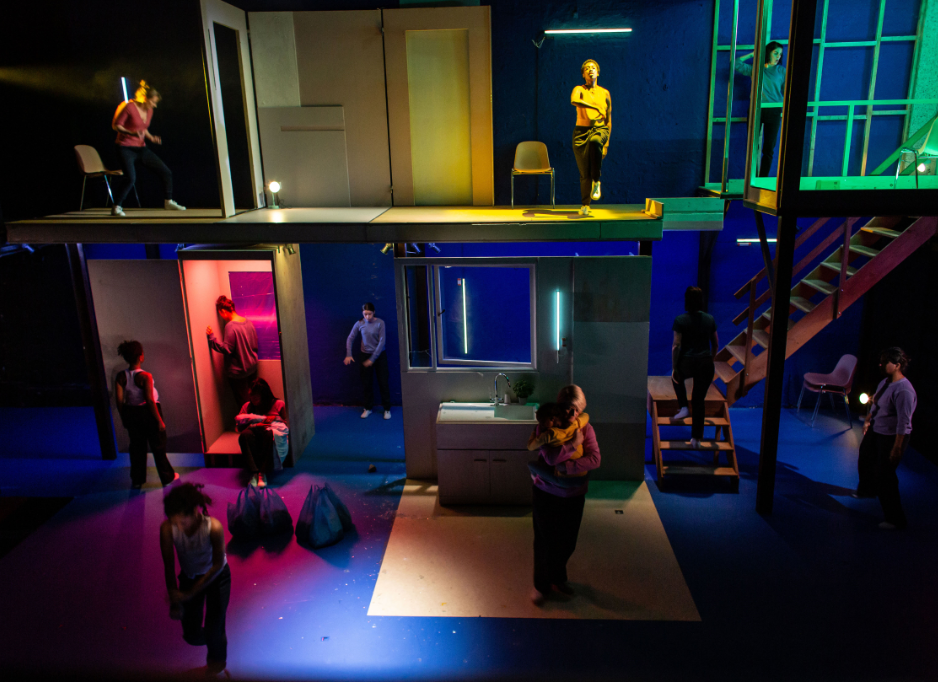
[BLANK] runs until 30 November and tickets from £10-£40 are available now.
Click here to book your [BLANK] ticket
Photography by Helen Maybanks
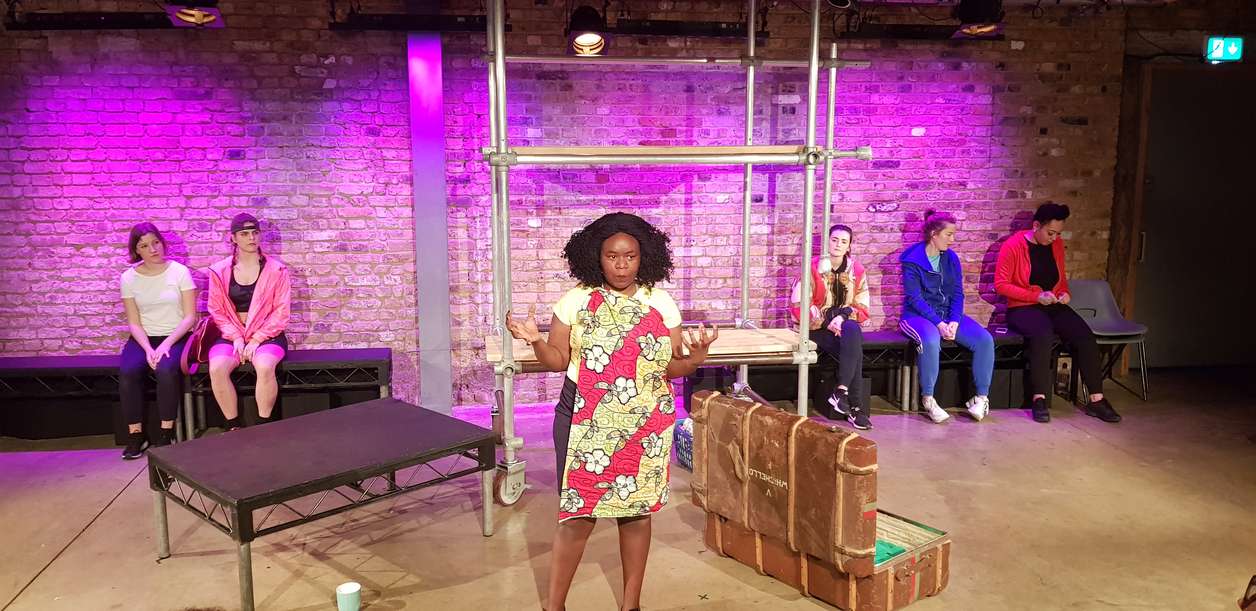
This year we were very proud to pilot our first Young Artists Development Programme. Over nine-months four extremely talented young women embarked on a programme of workshops, co-wrote an original production which was performed at both the Arcola and Hammersmith Lyric Theatres, and have each developed their own shows, covering topics such as mental health and police harassment. With this year’s programme now at an end, we spoke to these amazing and inspiring young women to find out what they have learned after the year and what the future has in store.
When I needed help, I wasn’t sure if Clean Break was for me. I didn’t think I qualified, deserved it, had enough experience, had too little experience. I didn’t really believe that there was a place that would be able to help because I felt so alone.
The first time I came into the building I cried and Carole gave me tissues. The second time was the same. The third I was so nervous I couldn’t eat, and everyone was so kind to me. Which almost made me cry again. That was two and a bit years ago. It was also in another universe.
This year I have co-written and performed in a play, developed a new solo show, been mentored by an inspiring writer and met and had the support of the most incredible group of people I know.
But it goes so much deeper than those practical, visible from the outside things. It actually goes so deep that it’s in the territory of not being able to be expressed in words at all. How do you sum up a year of such growth?
It’s in the laughter. The moments of clarity. The shared struggles. The times you don’t think you can, but you do it anyway. Having your space when you need it. Shared food. Cups of tea. Being able to say your name and look someone in the eye while you say it. Speaking your truth and knowing that people get it.
This year has been the start of me finding my voice. The one I’d squashed, ignored, clipped short. It’s going to be a continued and sometimes difficult journey towards feeling self-expression, not being angry, depressed or self-hating. But now it’s a journey that I’m looking forward to, not scared of. I’ve already taken the first step along the way.
I guess the most important thing that I've learnt on the young artist development programme is trusting in each other and believing that if you create an environment of true care and respect, people are going to do their best, and their best is more than enough. I learnt new ways of working and relating to each other in the world of theatre, where this environment is really rare to find. Of course, I had to very quickly learn how to write for theatre, what different roles in the production of a piece are and what you call stage left or right. But an even more precious discovery that I made is quite simple actually. Kindness is not a given thing or an innate personal quality, but it’s a practice. Similarly, love is not just a feeling but an action and solidarity or collaboration cannot come about unless there is true respect cutting deep, deep... and why wouldn't we respect each other? The gift of working with the people I did on this show, was a real privilege and I cannot express my gratitude for the commitment that each and every one of us had towards the play, but above all, towards each other.
My aspirations have developed into a more concrete realisation that I have found my path and direction in life and that from this moment on I am only ever going to be known and defined by my work in theatre and that my past doesn’t matter and all that came before this.
I am now sure as what I am going to do with my life and where I am going. I have gained complete confidence in my skills as a writer but also as a creative. I have something to say and my voice is important and needs to be heard. I am sure that I can create my own work as well as perform in other people’s works.
I want to speak my truth and show people how that can be a very powerful tool. I want to build femme solidarity and abolish the prisons. For that we need to open up new understandings of what a post-police, post-prison world might look like – what does transformative justice look like? How do we need to change the ways in which we hold ourselves and others accountable? I think theatre is a powerful too in imagining new futures. This programme enabled me to start to do that.
We would like to extend our thanks to the Co-Op Foundation for their support of the Young Artists Development Programme.
Click here to find more news and blogs from Clean Break.
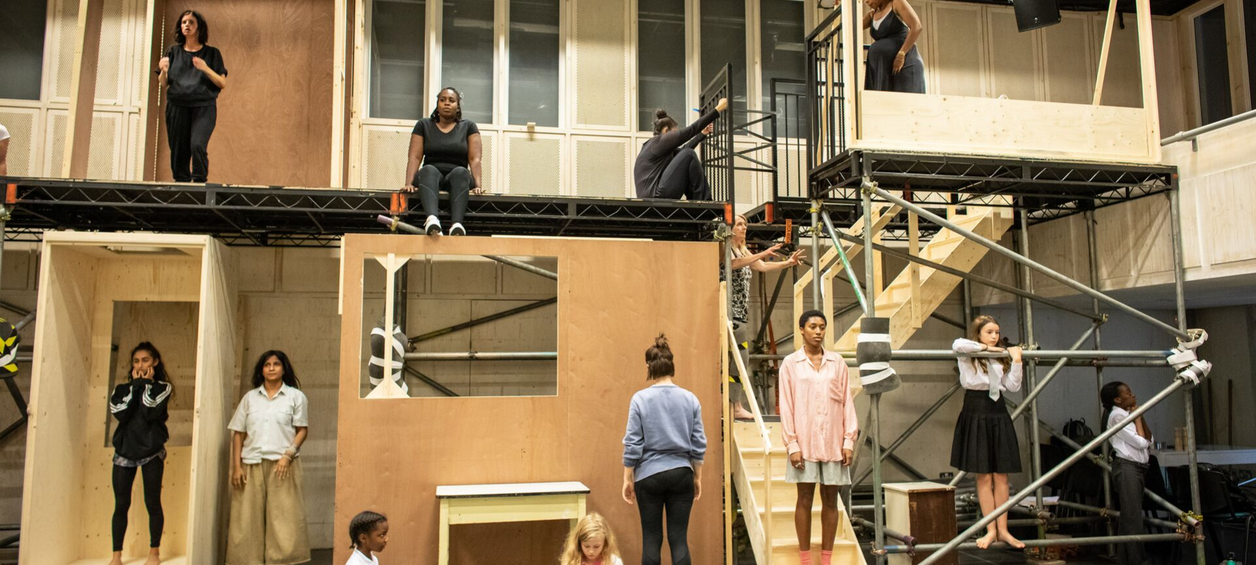
We’re delighted to share what’s been happening in the [BLANK] rehearsal room, over the past couple of weeks with the first set of pictures of our cast and creative team.
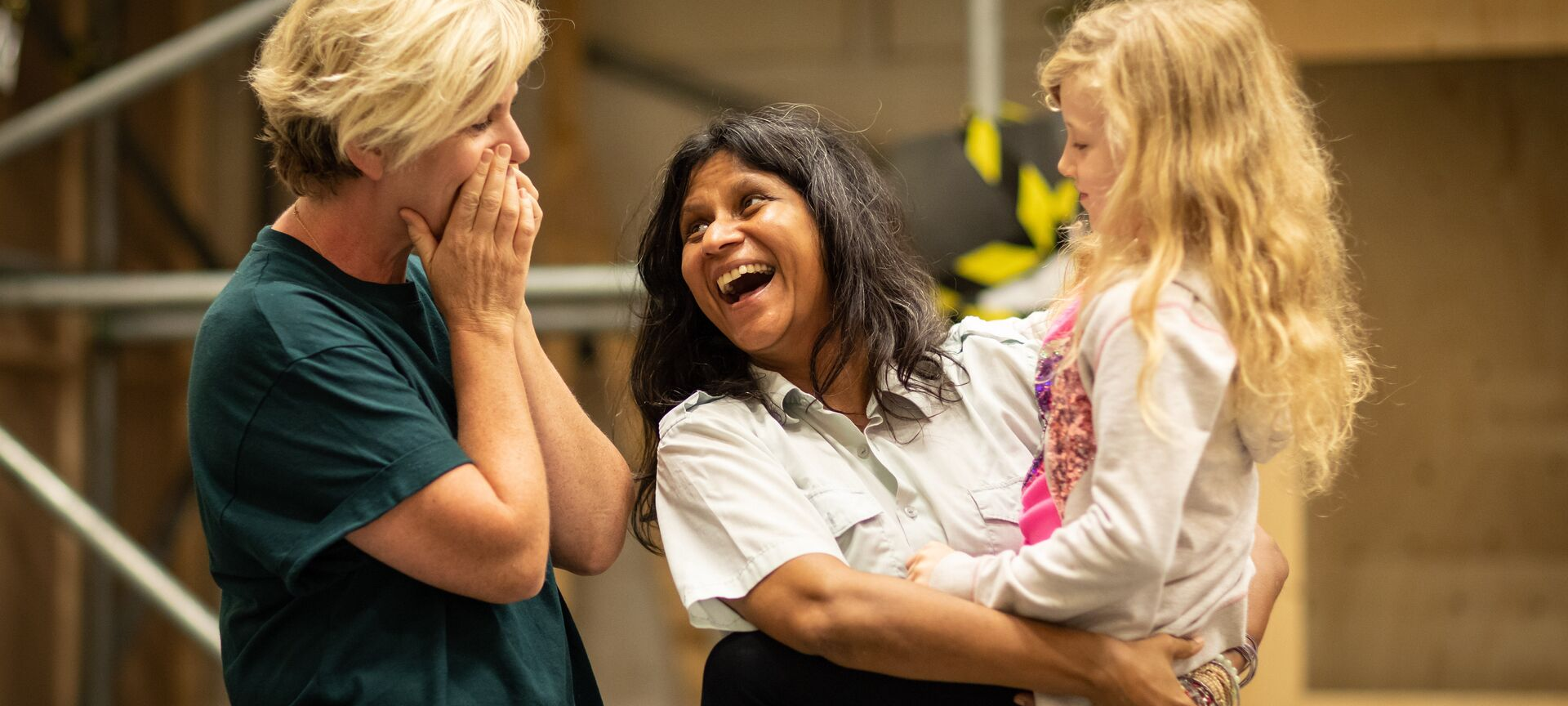
Rehearsals are taking place at the Donmar Studios, with the largest cast of any Clean Break production. [BLANK] is written by Alice Birch, directed by Maria Aberg and the cast includes; Ayesha Antoine, Shona Babayemi, Sophia Brown, Jackie Clune, Lucy Edkins, Zaris-Angel Hator, Zainab Hasan, Joanna Horton, Thusitha Jayasundera, Petra Letang, Leah Mondesir-Simmonds, Kate O’Flynn, Ashna Rabheru, Jemima Rooper and Taya Tower.
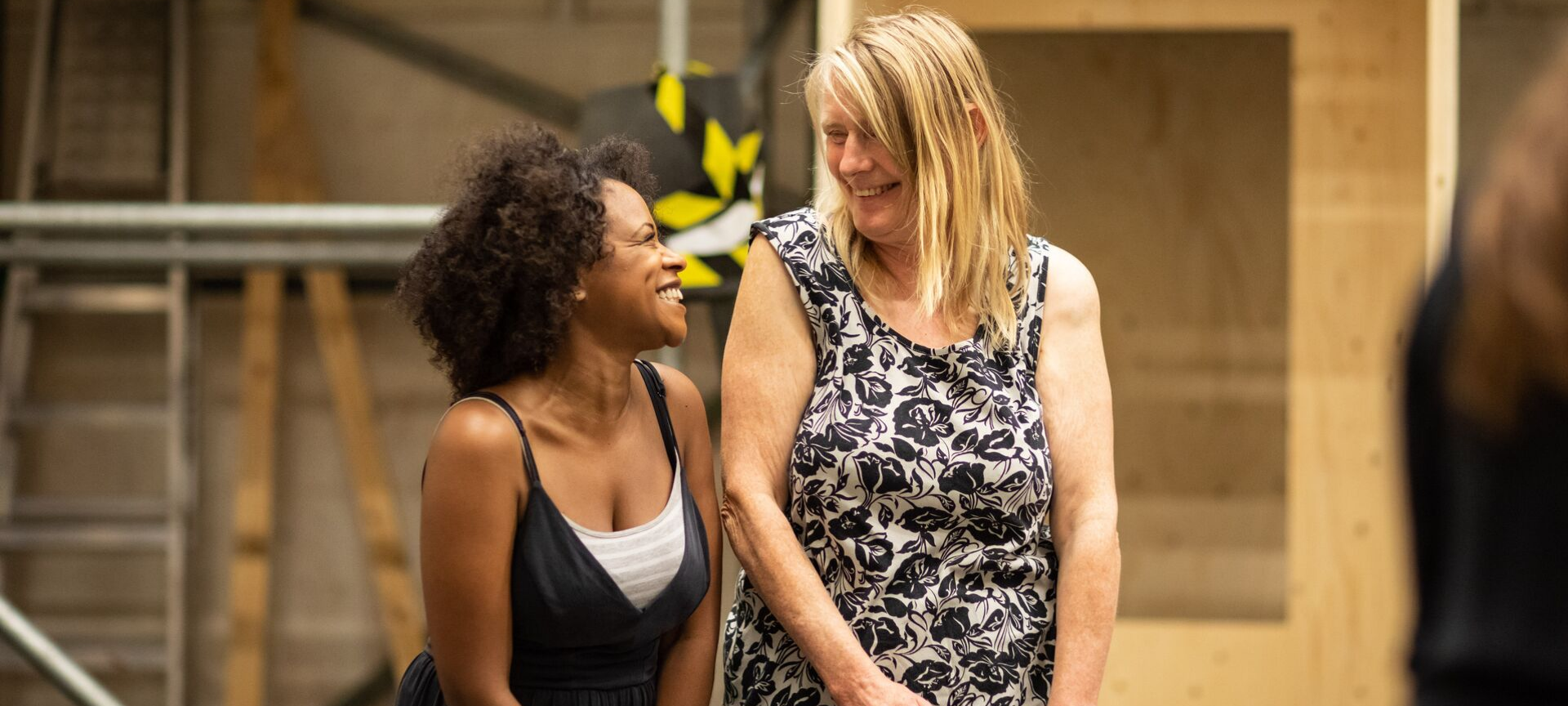
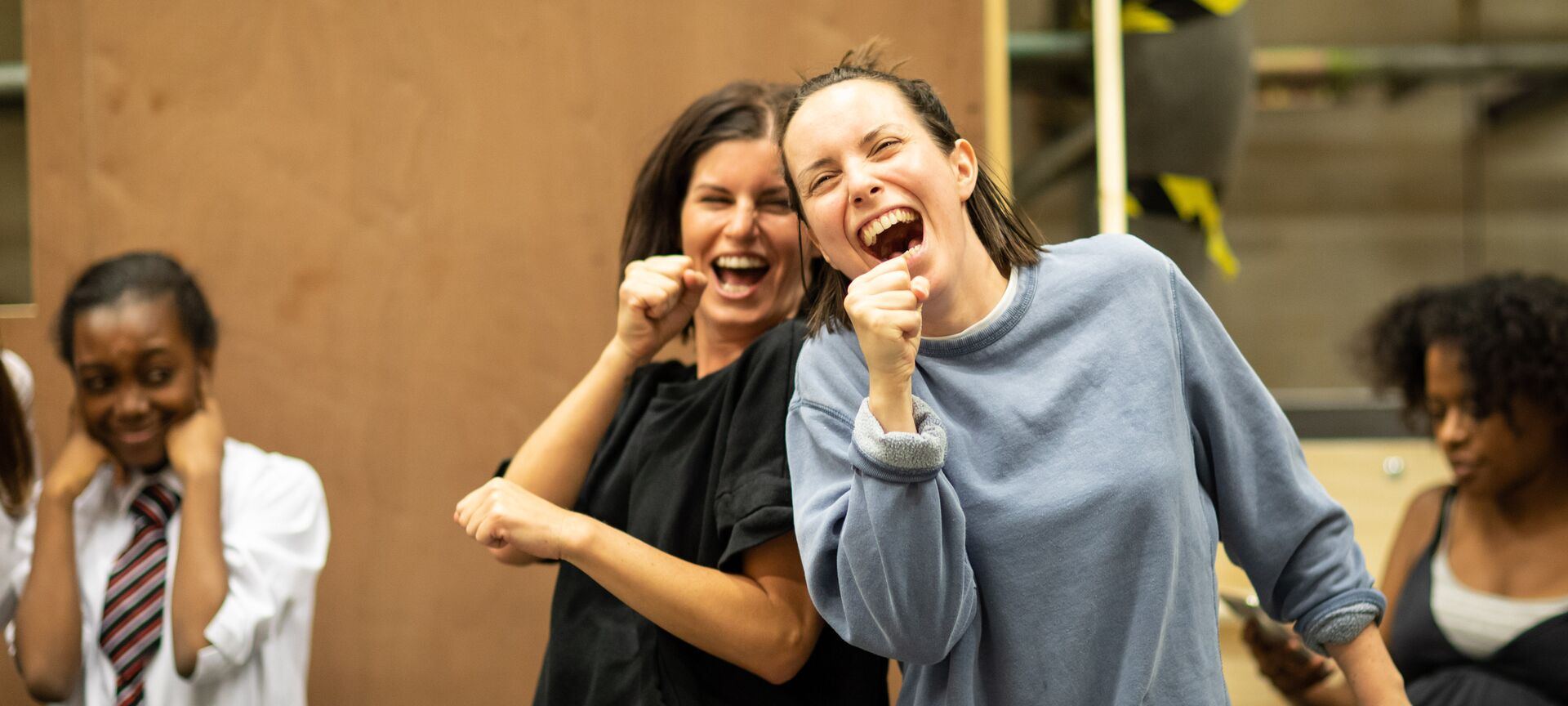
This heart-breaking new play reaches across society to explore the impact of the criminal justice system on women and their families. From 100 unnamed scenes, this theatrical provocation challenges the director Maria Aberg to construct an entirely unique production.
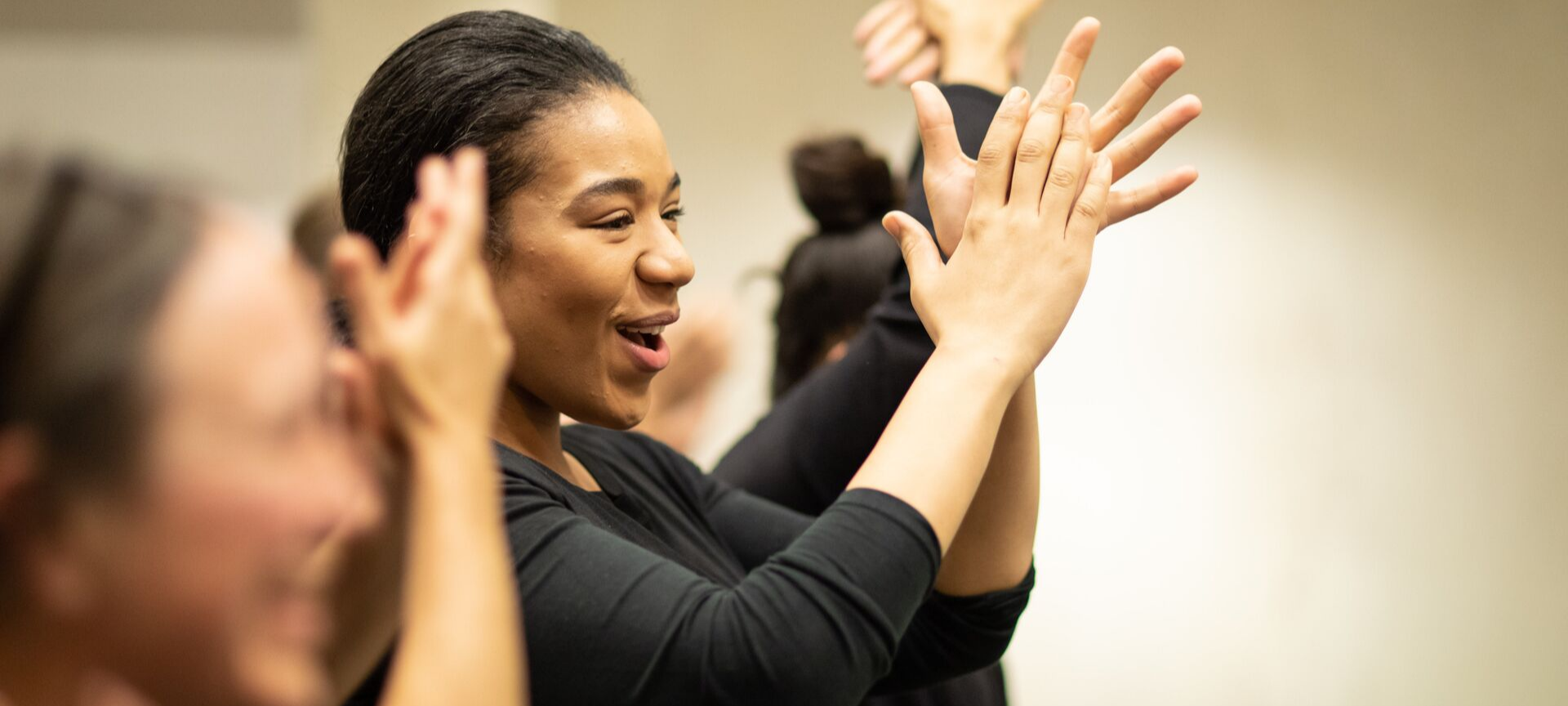
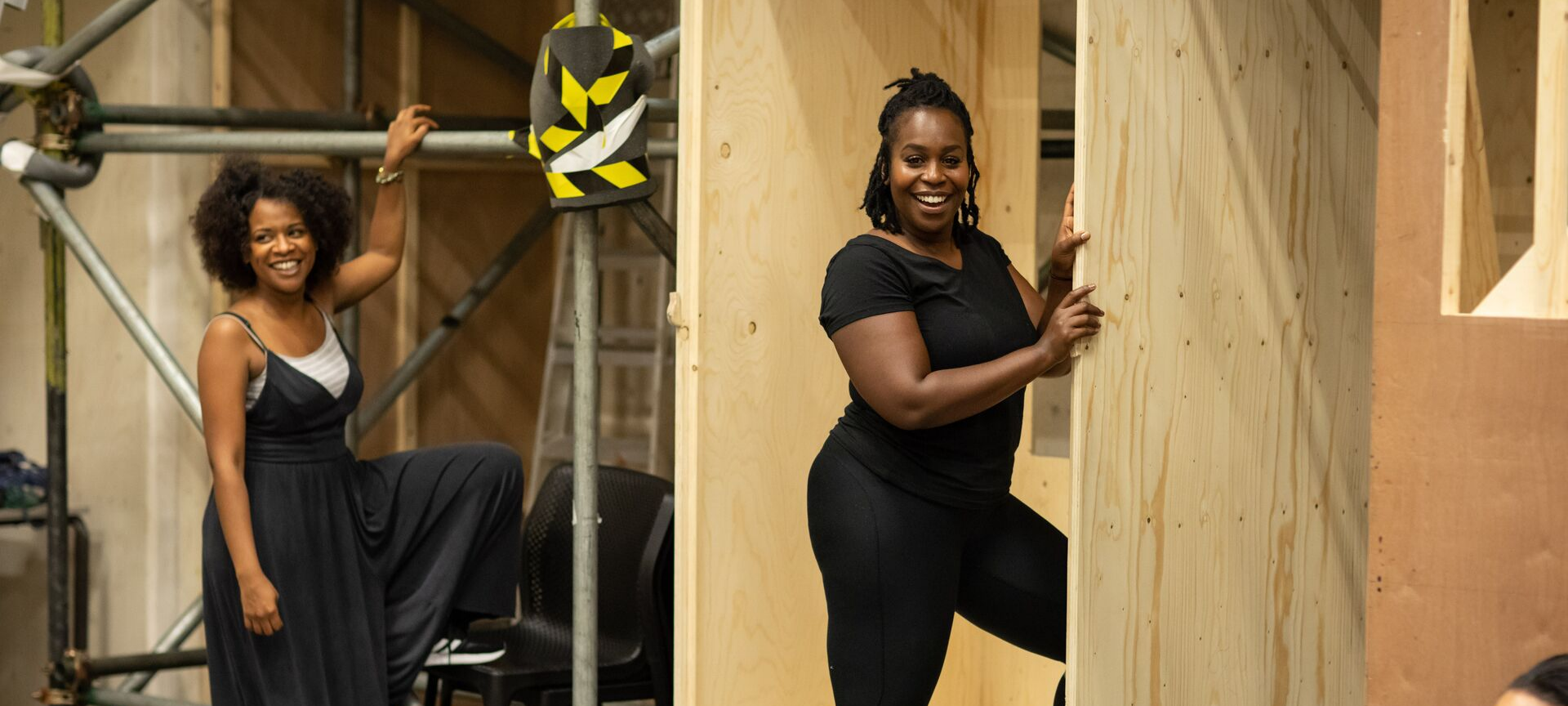
If you’d like to find out more about [BLANK] or book tickets to the production click here.
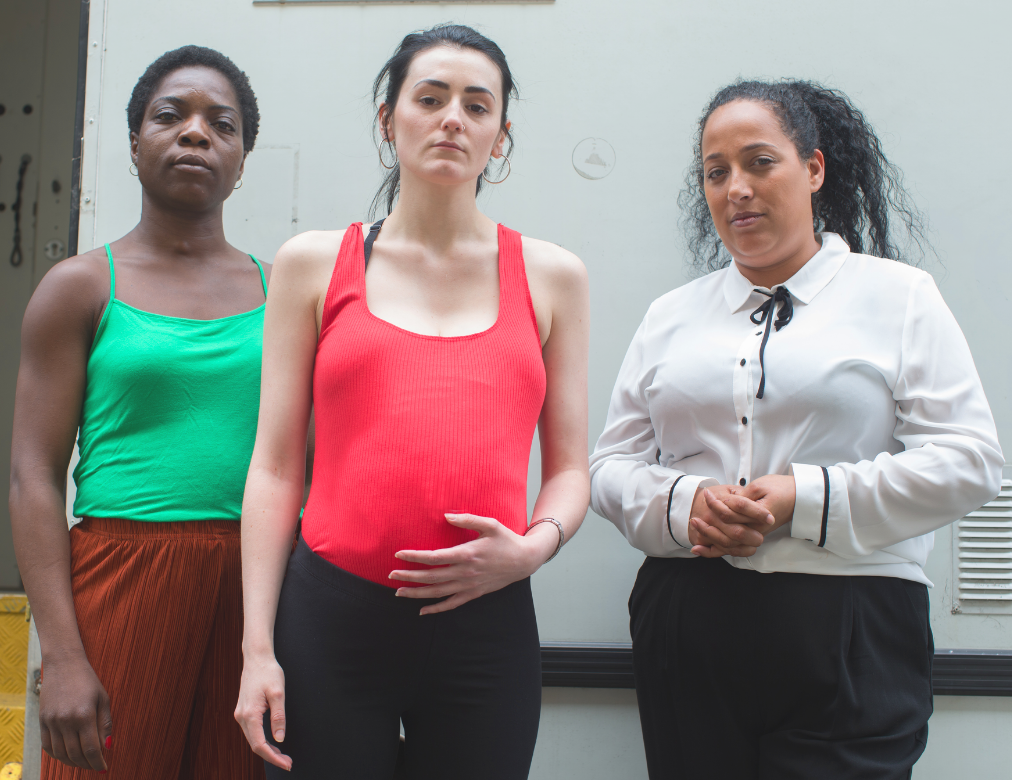
When a prison van drives past us, on our way to work, or on our way back from buying groceries at the supermarket, we think little about the stories of those held within; the people inside become nothing more than hidden cargo, transported to an unknown destination. It’s an experience of invisibility that many of our Members are all too familiar with, their trauma obscured by a series of walls. Yet with Chloë Moss’s Sweatbox these walls are broken down, bringing the hidden stories of arrival, anticipation, fear and resignation to light, forcing audiences to confront the cruelty of our prison system, even before perceived offenders are placed in cells.
In anticipation of the Sweatbox tour hitting Manchester we caught up with Anna Herrmann Joint Artistic Director of Clean Break and Director of Sweatbox and Dezh Zhelyazkova Producer of the play, to find out how the response to Sweatbox in 2019 has differed from it’s first outing in 2015.
Anna Herrmann: Prison vans are part of our environment, but only for those who either work in the system or who are caught up in it personally, are they any more than a backdrop to which we live our lives. Sweatbox The Play changes that – providing a unique chance to step inside a decommissioned van and experience what it is like.
In December 2018 new guidelines were put in place which included: the provision of seatbelts in cellular vans, men and women being transported in separate vans and pregnant women being given alternative transport. It has been positive to recognise these small but important steps to improve conditions for prisoners, especially at a time when our prison system is in crisis. However, it is devastating to witness the story of Rachel, one of the characters in the play who has been given a short sentence of six months for a first offence. The Government has acknowledged that short sentences are ineffective, and yet sadly Rachel’s story is still one that is very real and happening on a daily basis. It needs to stop. Women’s centres offer a viable and evidenced alternative to custody for women but are struggling to survive. We need to invest in these options and change the use of prisons in society for the future to benefit everyone.
We have been thrilled to see audiences come out of the show very moved and provoked to discuss the issues of women affected by the criminal justice system. The feedback from the first half of the tour has included praise for the writing and acting, which engage the audiences with the subject matter, on a deep personal level.
It has been interesting to hear from audiences that the reality of the storylines of the three characters is entirely new to them, and they have previously been unaware of how these experiences affect the women who have them.
Unconventional settings normally add novelty to productions but in the case of Sweatbox the prison van has been described as the 4th character in the play, as it provides for an extremely visceral experience which has resonated with our audiences and left them with food for thought about the destiny of the characters and the bigger picture of the systematic issues within the criminal justice system.
Through the stories of an expectant mother, a first offence, and a woman living with addiction, Sweatbox powerfully explores the varying contexts which contribute to female offending. Emotionally charged at its core, the play prompts us to question how services could have supported each woman and highlights the importance of preventative support for women struggling and at risk of offending.
If you’d like to find out more about Sweatbox click here.
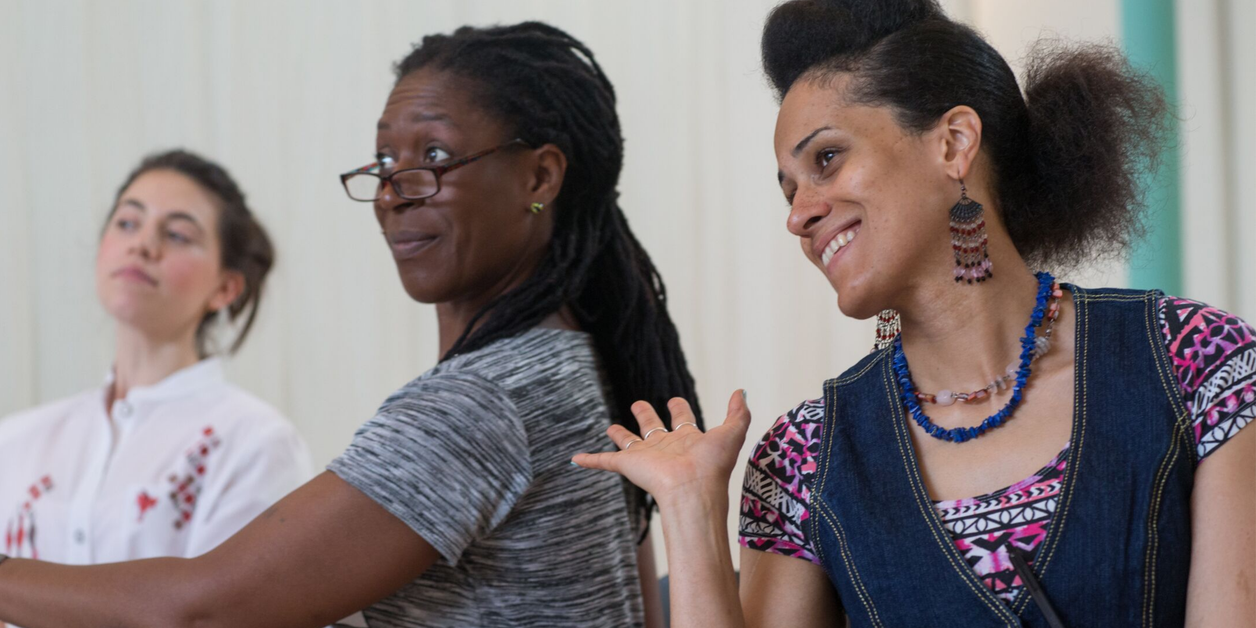
We are delighted to announce a new programme of training sessions where attendees can learn more about elements of our work including; arts in the criminal justice system, trauma-informed practice, and the Clean Break ethos and methods of working.
Click here to download our training programme brochure
Our training sessions include:
Safer Spaces - a one-day training course for theatre artists, criminal justice professionals and early career front line workers interested in developing their tool kit for working with young women in the criminal justice system and young women at risk of offending.
Staging Rehabilitation - a Clean Break masterclass in association with Geese Theatre Company. It is for theatre artists and criminal justice professionals interested in the specialised field of arts in the criminal justice system.
Rebel Voices - a monologue workshop for actors who want to explore unconventional characters and get support in their casting preparation.
Rewriting Justice - a one-day training course for theatre artists and emerging playwrights as well as criminal justice professionals with an interest in how to use playwriting with women in prisons and in community settings.
Unlocking Potential - a one-day training course for theatre artists, and early career group work facilitators interested in the art of creating safe and transformative women-only spaces. Drawing on the practice from our current Members Programme and former award-winning Education Programme, this day will provide participants with a rich toolkit to develop inclusive practice.
The Lab - a three-day intensive workshop for theatre artists interested in a more comprehensive, deeper engagement with our practice, encompassing both how we work with women to how we produce theatre for different audiences. The three days will incorporate working closely with Clean Break Members in a collaborative process which is central to how Clean Break fulfils its mission.
Rebel Voices, Unlocking Potential and The Lab are open to any participants who identify as a woman. All other courses are open to participants of any gender.
A limited number of bursary places are available to anyone who has had direct personal (not professional) experience of the criminal justice system. To apply for these, please write explaining your interest in the training event to general@cleanbreak.org.uk marking your email FAO Anna Herrmann.
If you would like to find out more about our training programme and book a session click here.
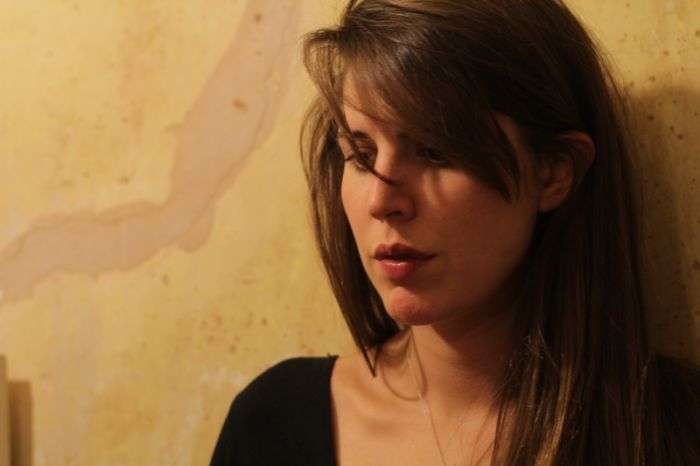
Arts journalist Holly Williams talks to Alice Birch on all things [BLANK], our new co-production with Donmar Warehouse and her experience of creating work with women with experience of the criminal justice system.
When I tell Alice Birch I’ve read her new play, she’s shocked: “You didn’t read the whole thing? Wowsers.” This is hardly the usual reaction at basic interview prep – but then, the 32-year-old’s latest script is hardly a usual play.
[BLANK] comes in at 214 pages, with 100 separate, self-contained scenes: 50 to be performed by adults, 50 written for children – although fear not, no production should ever stage the whole thing. Instead, Alice’s script begins “This play is a challenge and an invitation to you and your company to make your own play”.
The play looks at the experience of women in prison as well as the impact incarceration has on their families. All the characters are unnamed – simply designated A, B, and so on – but Alice does thread tantalising character arcs and thematic connections through this exhilaratingly experimental piece. It would be possible to stitch together some dramatic narratives about women’s paths in and out of prison – but equally possible to make something abstract and multi-voiced. Crucially, no two productions will ever be the same.
“It’s a strange thing,” Alice acknowledges. “You want to offer something that could be very character-driven, the stakes could be high…but you also want each scene to work on its own, in case a director wants to do something much more kaleidoscopic.”
Her work has always been driven by formal experimentation, from Revolt. She Said. Revolt Again. – a feminist text blowing up the conventions of gendered language, which won her the George Devine award – to the Susan Smith Blackburn prize-winning Anatomy of a Suicide, where the words of three generations of women are scored like a piece of music so that they overlap.
In the case of [BLANK], the structure grew out of a very specific set of restrictions. Clean Break actually gave Alice her first ever commission, following the success of her first play, Many Moons, at Theatre 503 in 2011. But Alice “couldn’t find the right thing for ages.” Then, the National Theatre’s Connections Festival, which commissions plays for young people, approached her about writing something too.
Most people would probably not leap to the idea of combining a play for a large youth cast and a play for adult women. But it was this “impossibility” that finally fired Alice’s imagination.
“I couldn’t see a world in which those two things existed – and then that became the point,” she explains. For the young people, the play is about the absence of their mother; for the adult women, it’s about being separated from their children.
[BLANK] has already been performed by NT Connections groups, using mostly the children’s scenes, and watching proved surprising: “You go ‘oh I didn’t see that in it, that’s really thrilling. And terrifying.”
The production, for the first time drawing on all 100 scenes available, will be performed by a cast of adult women, including two Clean Break members, as well as a few children or teenagers. How involved is Alice in shaping this production with Maria Aberg, in choosing which scenes make it in?
“I genuinely don’t know the answer to that,” she says. “I can’t say what should be in the production, otherwise I would have written that play.” And that’s why it’s titled [BLANK] – the invitation is genuinely open. But she adds that there is “something about the kaleidoscopic version that keeps it big, which I think is useful.” That broader approach may reveal how structural inequities within society and within the criminal justice system can funnel women into a cycle of crime and reoffending. Those structural problems are what have fuelled Alice through the writing of this play.
[BLANK] goes to some bleak places, but Alice felt she had to reflect the reality of a failing, overloaded system. “There’s a scene about someone having to make 45 meaningful observations [of female prison inmates] in an hour, and each of those people is at risk of self-harm or suicide. That was a figure I’d taken from a real-life inquest,” she says. “It is horrific: these women are dying. How society treats its most vulnerable says everything – and I think we treat prisoners appallingly.”
Alice had been an admirer of Clean Break since she first started writing. “As a young female playwright, lots of the texts I was picking up were commissioned by Clean Break. And often the plays felt quite quiet; it wasn’t about women walking into places and shooting everybody, it wasn’t highly glamorised. I really felt drawn to the quiet craft, the kindness.”
It’s an important point. Alice’s plays often have a ferocity and anger that’s certainly not evident when you meet her in person – she is a gentle presence, thoughtful and considered. And to see her work as just a howl of rage would be wrong: “I think kindness is really what I’m writing about all the time.”
Holly Williams is an arts journalist and editor. She reviews theatre for Time Out and the Mail on Sunday.
This piece originally featured in the Donmar Magazine.
Click here to find out more about [BLANK]
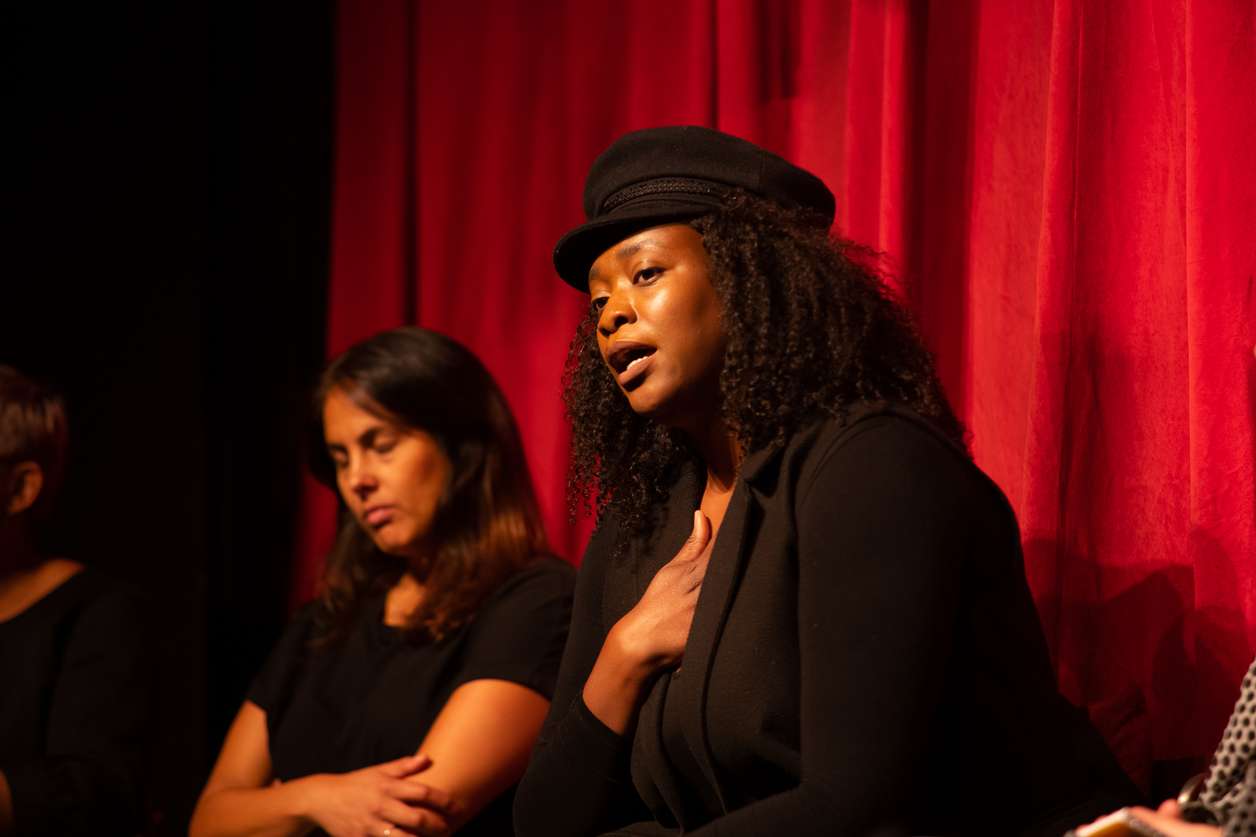
On 7 September Clean Break arrived at the Royal Court with nine Clean Break Writers from past and present, a prison van and some incredibly excited staff members for our event Clean Break Writer’s: Here. There. Then. Now.
The event consisted of two panels where Clean Break writers shared their experiences of working within the creative industry and at Clean Break. The first panel was hosted by Paulette Randall and brought together Clean Break voices from the past including; Jacqueline Holborough (Co-Founder, Clean Break and writer of Killers), Tanika Gupta (Inside Out), Winsome Pinnock (Mules), Rebecca Prichard (Yard Gal) and Lucy Kirkwood (it felt empty when the heart went at first but it is alright now).
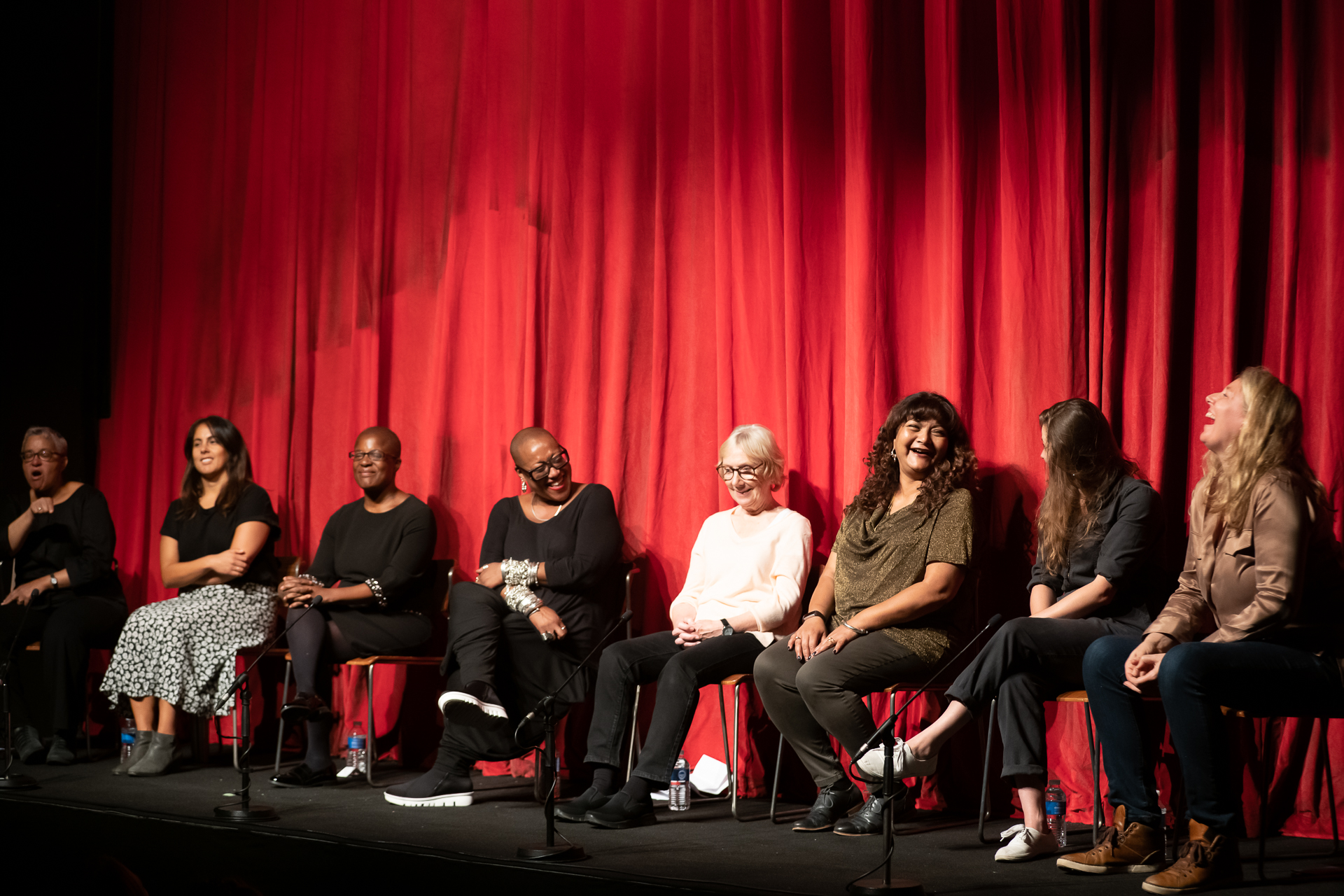
The conversation focused on the importance of how you tell stories of women in prison, with a focus on how you weave in voices of women serving sentences instead of attempting to speak for them. Winsome Pinnock culminated the discussion perfectly by stating; “I thought it was so important that I would not take their story, because I’m a playwright, and every play I write will do something for my career and there’s something about not using someone else’s story in that way, that you’re not ever going to appropriate someone’s story”.
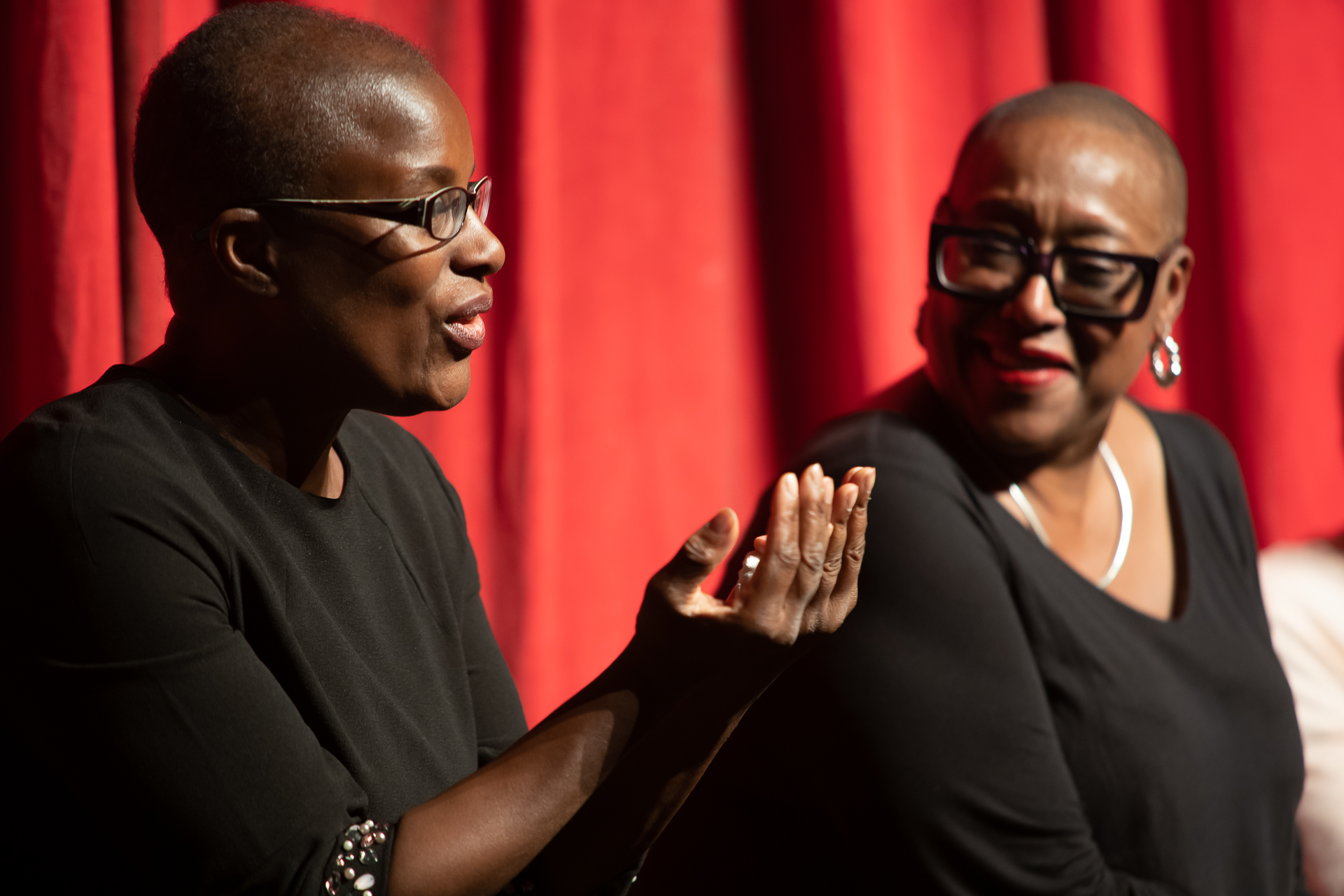
The second panel was hosted by Jane Fallowfield and included writers that have worked with us over the past five years; Sonya Hale (Blis-ta), Tash Marshall (Clean Break Writer in Residence 2018), Stacey Gregg (co-creator, Inside Bitch) and Somalia Seaton (House).
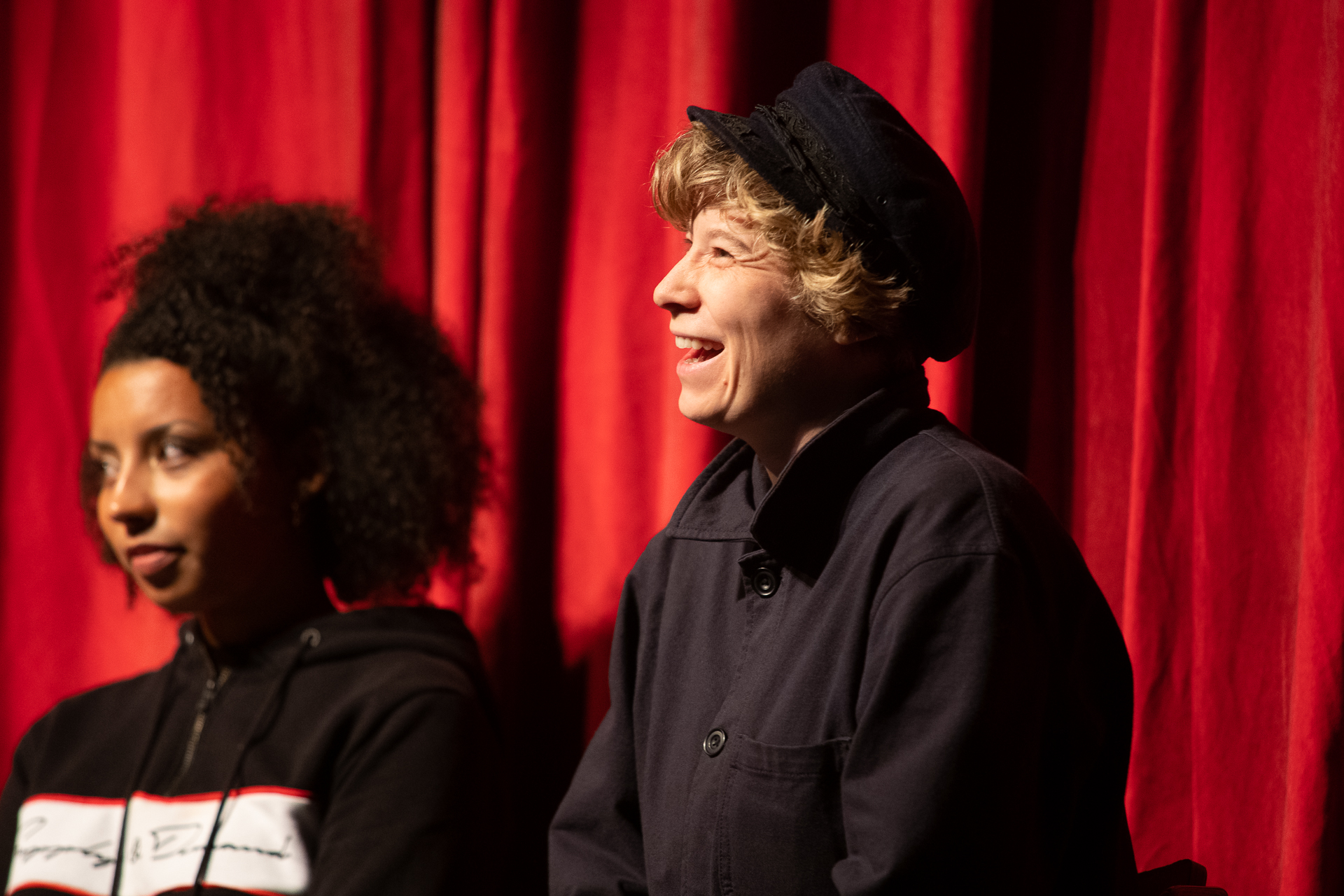
The panel talked extensively through the process of working at Clean Break and focused on the importance of giving women the opportunity to grow within their writing in a supportive environment. All agreed on the importance of allowing space for people to write their own experience, highlighting the importance for those marginalised in the creative industries to have space to grow within their craft in a supportive and nurturing environment. Sonya Hale highlighted the conversation perfectly by stating, “It’s so important that women, and women of colour and working-class women are given a platform and the time, encouragement and finance to learn the skills to [tell their own stories]”.
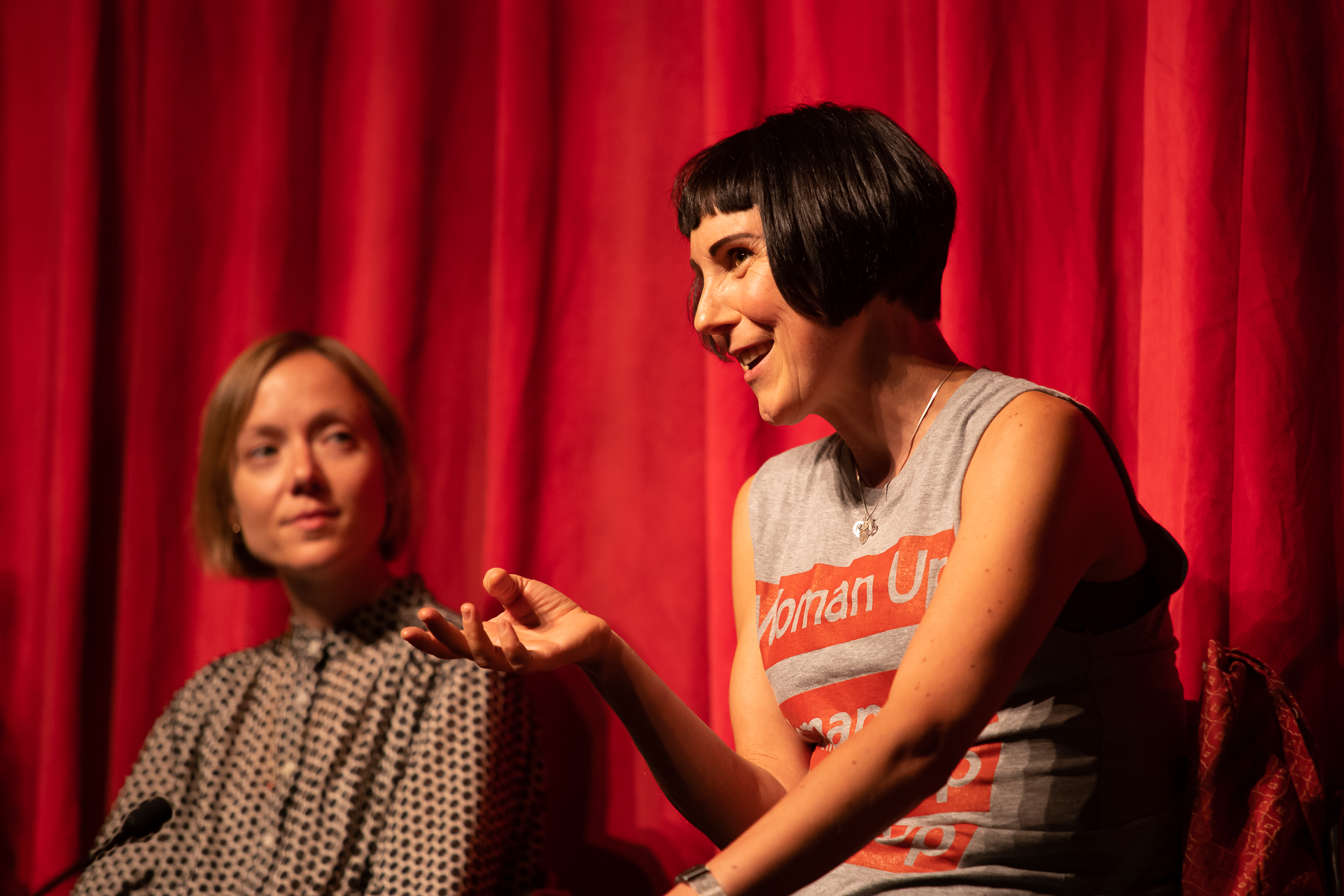
But it wasn’t only the panel discussions that made our Saturday takeover of the Royal Court so special. As audience members made their way through Sloane Square they were greeted by the Sweatbox prison van, which held six sold out performances right outside the theatre. Sweatbox Producer Dezh Zhelyazkova commented; "Performing Sweatbox in front of the Royal Court Theatre felt epic for the company. Bringing the stories of society’s most marginalised to Sloane Square in a prison van, provided for a very surreal setting and inspired numerous conversations with our audience members and passers-by. This meeting of two very contrasting worlds enabled us to expand the reach of our work and create new and exciting connections".
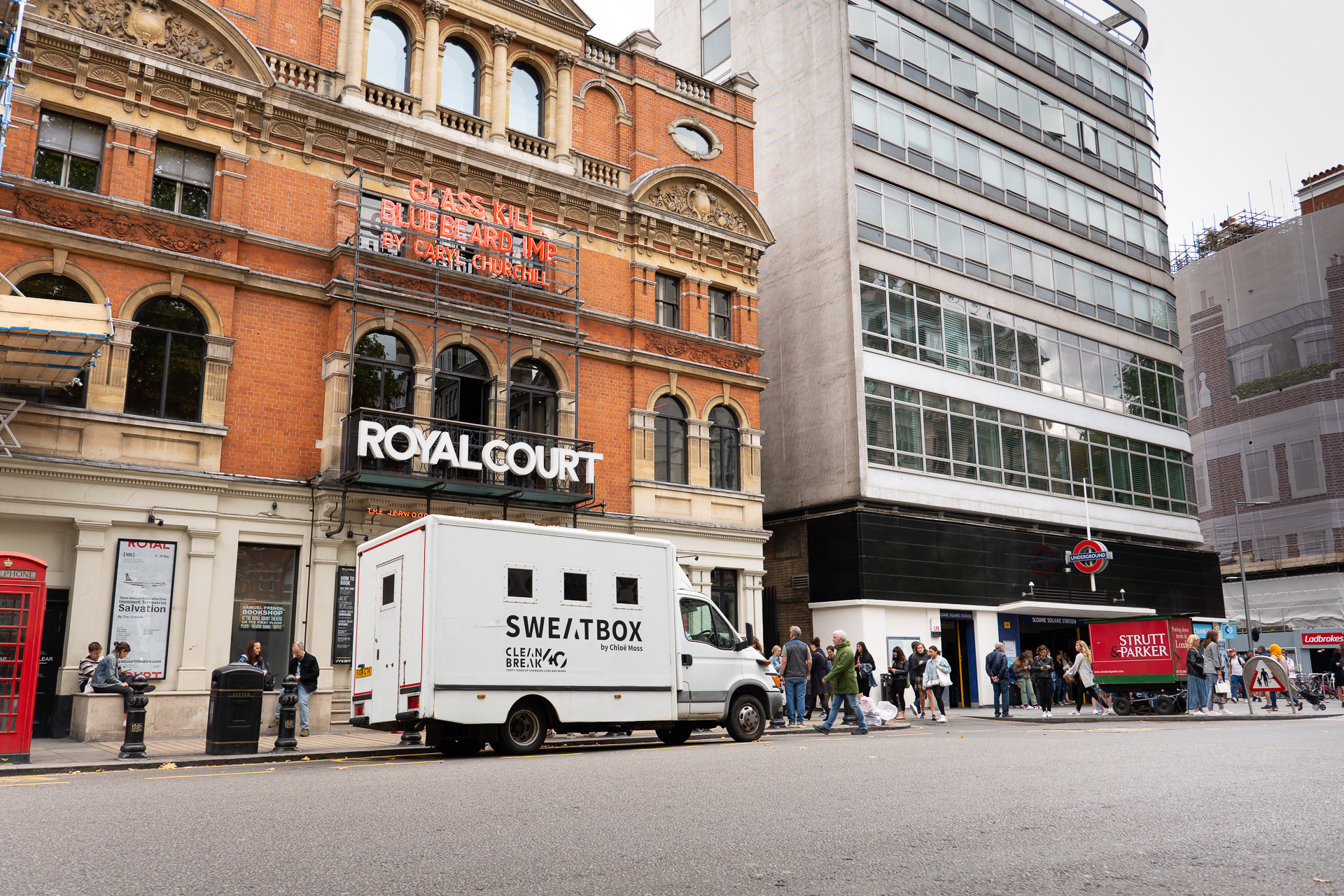
Click here to find out more information on upcoming Clean Break events.
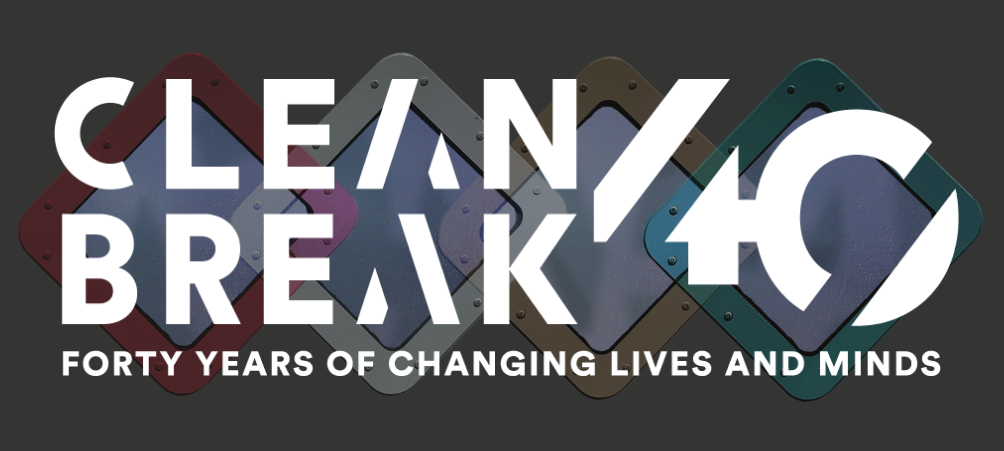
We are delighted to announce three new Trustees joining our exceptional Board as we continue our 40th Anniversary Year and beyond. The appointments include Tess Randolph and Amanda Richardson, who have experience in the women’s and theatre sectors and are Clean Break Members; and Alison Jefferis, Head of Corporate Affairs at Columbia Threadneedle Investments, who has served on Clean Break’s Development Committee since 2014.
Tess Randolph has worked with organisations including Advance Minerva and Women’s Trust, as a volunteer, mediator and ambassador. She recently graduated with a Psychology and Counselling Diploma from Birkbeck University and has been a Member of Clean Break since 2014. She commented; “I am passionate about social justice and encouraging women’s voices to be heard from every age and background. Clean Break gave me a voice and in my new capacity as a Trustee, I look forward to helping other women to grow and flourish and to find theirs.”
Alison Jefferis is Head of Corporate Affairs (EMEA, APAC) at global investment firm Columbia Threadneedle Investments, a member of the firm’s Talent Advisory and Culture & Conduct Advisory Groups, and Chair of Columbia Threadneedle Foundation. She has over 20 years’ experience in corporate philanthropy and has been a member of Clean Break’s Development Committee since 2014. She shared; “I’m delighted to join the Board of Clean Break, a thriving charity doing vitally important work, giving a voice and a platform to women whose stories are rarely heard. Clean Break is a courageous and caring organisation with its Members firmly at its heart, and I look forward to both learning from and contributing to its continued success.”
Amanda Richardson worked in the care sector before more recent customer service roles at The Koestler Trust and Southbank Centre, and volunteer work with projects at Talawa Theatre Company, The Place and Citizens Advice Bureau. As an actor, she has trained at Royal Central School of Speech and Drama, and been a Member of Clean Break since 2012. She told us; “I am committed to equal opportunities and to fighting discrimination. I am delighted that in my new role as Trustee of Clean Break, I will be able to help and engage with women involved with the criminal justice system, and those suffering with mental health and drug issues to lead more positive lives.”
Kim Evans OBE, Chair commented on the new appointments stating; “Clean Break’s Board is made up of an experienced and committed group of women from the theatre, criminal justice, women’s and financial sectors. We are delighted to have appointed Tess, Alison and Amanda who each bring additional expertise to the Board and will help us ensure that the voices of our Members remain at the heart of the company’s work and governance.”
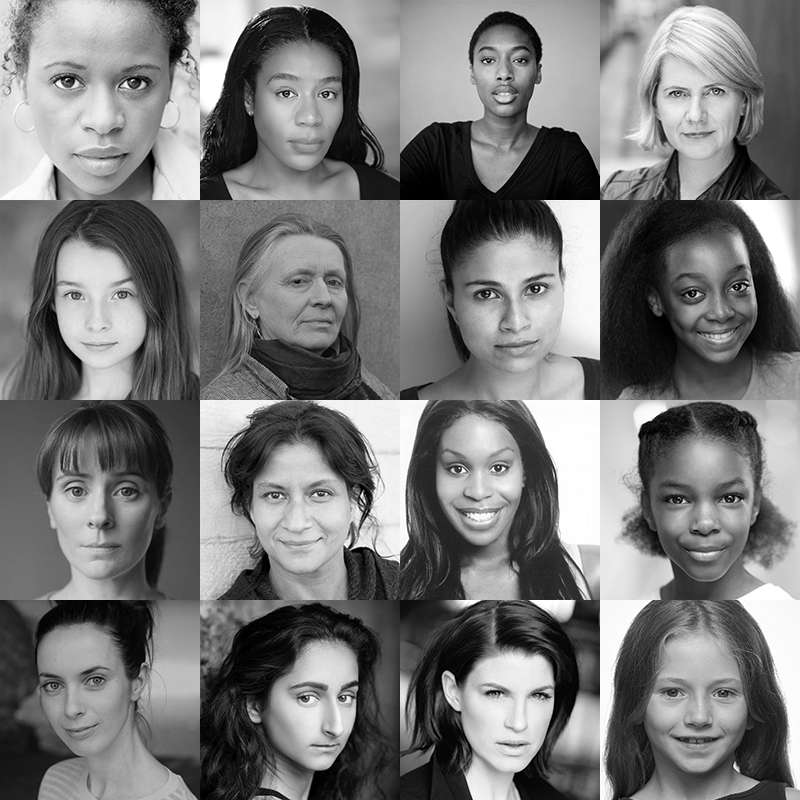
We’re excited to announce the full casting for the world premier of [BLANK] a new play by Alice Birch. Directed by Maria Aberg, full casting includes Ayesha Antoine, Shona Babayemi, Sophia Brown, Jackie Clune, Lucy Edkins, Zaris-Angel Hator, Zainab Hasan, Joanna Horton, Thusitha Jayasundera, Petra Letang, Leah Mondesir-Simmonds, Kate O’Flynn, Ashna Rabheru, Jemima Rooper and Taya Tower.
Alice Birch’s heartbreaking new play reaches across society to explore the impact of the criminal justice system on women and their families. From 100 unnamed scenes, this theatrical provocation challenges the creative team to construct an entirely unique production. Directed by Maria Aberg, [BLANK] is part of our 40th Anniversary celebrations and the highlight of our Autumn Season.
Alice Birch (Writer) is the winner of the Arts Foundation Award for Playwriting 2014, the co-winner of the George Devine Award for Most Promising Playwright 2014 and was shortlisted for the Susan Smith Blackburn Award in 2012 and 2015. Theatre includes: La Maladie de la Mort (Bouffes de Nord); Anatomy of a Suicide (Royal Court), Schatten (Schaubuhne); Revolt. She Said. Revolt Again. (RSC and Soho Rep), Ophelias Zimmer (Royal Court and Schaubuhne, Berlin), We Want You to Watch (National Theatre), Little Light (Orange Tree), Little on the inside (Almeida and Clean Break) and Many Moons (Theatre 503). Film includes Lady Macbeth for the BBC, BFI and Creative England which was the winner of the International Critic’s Prize at San Sebastian Film Festival 2016, the Best First Feature at Zurich Film Festival 2016, Best Screenplay at Turin Film Festival 2016 and Best Screenplay at the British Independent Film Awards 2017.
Maria Aberg (Director) Maria’s recent work includes Little Shop of Horrors (Regent’s Park Open Air Theatre), Dr Faustus, The White Devil, As You Like It, King John, The Gods Weep, Days of Significance (RSC), Hotel (National Theatre), Much Ado About Nothing (Royal Exchange, Manchester), The Chairs (Theatre Royal Bath), Alaska (Royal Court) and Roald Dahl's Fantastic Mr Fox (Nuffield, Southampton and Lyric Hammersmith).
Ayesha Antoine her theatre credits include Hamlet and Red Velvet (Kenneth Branagh Theatre Company), Life of Galileo and Trade (Young Vic), Dirty Great Love Story (Arts), The Suicide (National Theatre), The Wolf in Snakeskin Shoes and The House That Will Not Stand (Tricycle), The Ghost Train (Royal Exchange, Manchester/Told By An Idiot), Venice Preserv’d (The Spectator’s Guild), We Are Proud to Present a Presentation About the Heroero of Namibia (Bush), Tartuffe (Birmingham Rep), Surprises and Absurd Person Singular (Stephen Joseph Theatre), Cinderella, Red Riding Hood, Madblud and Familyman (Theatre Royal Stratford East), One Monkey Don’t Stop No Show (Eclipse Theatre), The Mountaintop (Derby LIVE), Blue/Orange (Arcola), My Wonderful Day (Off Broadway/UK Tour), The Thirteen Midnight Challenges of Angelus Diablo (RSC), Big White Fog (Almeida), Master Juba (Luton Library Theatre), Upstairs in the Sky (Quicksilver Children’s Theatre) and The Firework Maker’s Daughter (Lyric Hammersmith). Her TV credits include The Long Song, Thunderbirds Are Go!, Chewing Gum, Nurse, Pompidou, Bellamy’s People, Skins, Mouth To Mouth, Holby City, Doctor Who, Parents of the Band, Bigger Better Brighter, Placebo, Kerching, The Bill and Grange Hill.
Shona Babayemi commenced training with the Identity School Of Acting (IDSA) after studying Theatre and Drama Studies at the University of London. Whilst working with Cardboard Citizens, Shona had the opportunity of working internationally in Berlin - performing in Invisible People (Ufa Fabrik International Culture Centre). She went on to tour with the company in their production of Rising, playing Danielle. Joining The School For Wise Children, Shona worked alongside theatre director Emma Rice, devising and exploring varying theatrical techniques. She is an avid writer and spoken word artist and continues to pursue this as a Soho Theatre Writers Member. She will join the Royal Court Theatre’s Playwriting group in January 2020. Shona remains an ardent and active member of the Clean Break Theatre Company, participating in workshops and programmes as well as recently performing in their promenade production All the Lights Are On as part of the company’s 40th anniversary celebrations.
Sophia Brown her TV credits include The Capture, Girl Haji, Marcella, Clique, Guerrilla, Casualty and Top Boy. Her film credits include A Battle in Waterloo, Disobedience, Beauty and The Beast and Genius.
Jackie Clune returns to the Donmar Warehouse after appearing in Measure for Measure, the Shakespeare Trilogy, Henry IV and The Vote. Jackie also appeared in The Tempest and Henry IV at St. Ann’s Warehouse, NY. Her other theatre credits include Emilia (Vaudeville), Utility (Orange Tree), Fallen Angels (Salisbury Playhouse), Candide (Menier Chocolate Factory), 9 To 5 (Ambassadors), Mogadishu (Lyric Hammersmith), Mamma Mia (Little Star), Julie Burchill Is Away (Soho) and Showstopper (G & J). Her TV credits include Motherland (series 1 & 2), Good Omens, Three Girls, Borderline, Breathtaking, The Bill, Eastenders and Waking the Dead. Her film credits include Jawbone and Denial.
Lucy Edkins her previous acting credits include Inside Bitch (Royal Court). Lucy has been involved with Clean Break since the mid-90s, following her work with Nomads..., a theatre and film company she co-founded which worked with vulnerable groups (including prisoners) and performed plays in unconventional venues. Lucy has taken part in workshops with Clean Break including a Complicité workshop culminating in a devised piece, The Ex-Industry, performed in local prisons and a rehab unit. She went on to work professionally with Clean Break in their stage management teams, on productions including Mules and Yard Gal at the Royal Court, touring nationally with the latter around prisons and art centres. Her work in theatre also includes stage managing and an assistant director on Life After Life (National Theatre). Since 2003 she has concentrated on artistic work across media, including a couple of years playwriting and showcasing new works. Her television and short film credits include and Eleanor.
Zaris-Angel Hator her theatre credits include Fanny and Alexander (Old Vic), Peter Pan (Adelphi) and Matilda (RSC). Her TV credits include The Midnight Gang, Nella The Knight, The Forgiving Earth, Victoria and Sainsbury’s Christmas. Zaris-Angel trains full-time at the Sylvia Young Theatre School.
Zainab Hasan returns to the Donmar Warehouse after appearing in the Shakespeare Trilogy and Henry IV. Zainab also appeared in The Tempest and Henry IV at St. Ann’s Warehouse, NY. Other theatre credits include My White Best Friend (Bunker), Tamburlaine, Tartuffe and Timon of Athens (RSC), Hijabi Monologues (Bush), Boy (Almeida), Tory Boyz, Romeo and Juliet and Prince of Denmark (Ambassadors), Red Riding Hood (Latitude Festival), On The Dole (Lyric Hammersmith), D and The Boyfriend (Oval House), Routes (Hampstead) and Totally Over You (Tricycle).
Joanna Horton her theatre credits include Othello (Shakespeare’s Globe), All’s Well That Ends Well, As You Like It, The Gods Weep and Days Of Significance (RSC), Belongings (Hampstead), The Cherry Orchard (Birmingham Rep), Town (Royal & Derngate, Northampton). Her TV credits include Endeavour, Dark Angel, Silent Witness, Partners In Crime, Children Next Door, Knifeman, The Suspicions of Mr Whicher, Father Brown, London’s Burning, Doctors, Permanently Excluded, Holby City, New Tricks, Breaking The Mould, The Bill, Midnight Man, Bike Squad, Holby Blue, Five Days, Robin Hood, Spooks, Eleventh Hour, Afterlife and Foyle’s War. Her film credits include Fish Tank and The Listener.
Thusitha Jayasundera her theatre credits include Our Town (Regent’s Park Open Air), Stories, Behind The Beautiful Forevers, Crime and Punishment and War Horse (National Theatre), The Divide (Old Vic/King’s, Edinburgh), The Vertical Hour (Park), Tiger Country (Hampstead), A Day at the Racists (Finborough), Dreams of Violence (Out of Joint/Soho/UK Tour), Twelfth Night, As I Lay Dying (Young Vic), and Cain, Peer Gynt, Pentecost, The Comedy of Errors (RSC). Her TV credits include Humans, Midsomer Murders, Doctor Foster, Broadchurch, The C Word and Above Suspicion.
Petra Letang her theatre credits include Soul (Royal & Derngate, Northampton), Random (Chichester), Pandora’s Box (Arcola), Truth & Reconciliation, Fallout, Escobar Estate, Breath Boom and Rough Road to Survival (Royal Court), Every Coin (Synergy Theatre Company), Joe Turner’s Come and Gone and Generations of the Dead (Young Vic), My Wonderful Day (Off Broadway), Baby Girl/The Miracle and The President of an Empty Room (National Theatre), The Weave and Badnuff (Soho), How Love is Spelt (Bush), Beautiful Thing (Nottingham Playhouse), Mules (Clean Break) and Local Boy (Hampstead). Her TV credits include The Reluctant Landlord, Little Boy Blue, People Just Do Nothing, Holby City, Secret Dude Society, Eastenders, The Bill, The Last Detective, Jonathan Creek, Babyfather 2 and Family Affairs. Her film credits include Betsy and Leonard, Wondrous Oblivion and A Heart Divided.
Leah Mondesir-Simmonds makes her Donmar Warehouse debut in [BLANK]. Her TV credits include Holby City.
Kate O'Flynn her theatre credits include The End of History, Anatomy of a Suicide, The Ritual Slaughter of Gorge Mastromas and A Miracle (Royal Court), One for the Road/Mountain Language/Ashes to Ashes (Harold Pinter), The Glass Menagerie (Duke of York’s/Edinburgh International Festival), The Trial (Young Vic), A Taste of Honey and Port (National Theatre), Lungs and The Sound of Heavy Rain (Paines Plough/Crucible, Sheffield), Marine Parade (ETT), The Whisky Taster (Bush), The House of Special Purpose (Chichester), See How They Run and The Children’s Hour (Royal Exchange, Manchester). Her TV credits include Brexit, No Offence, Wanderlust, Doctor Thorne, Not You Again, Ordinary Lies, New Tricks, Room at the Top, Playhouse Presents: The Snipist, Above Suspicion, The Syndicate, The Suspicions of Mr Whicher, Kingdom, The Palace and Trial & Retribution. Her film credits include Peterloo, Bridget Jones’ Baby, Mr. Turner, Up There and Happy Go Lucky. Her awards include the Clarence Derwent Award and Olivier Award nomination for Best Actress in a Supporting Role for The Glass Menagerie, a Manchester Evening Standard Award for Best Newcomer for The Children’s Hour, a TMA Award for Best Supporting Actress for The Children’s Hour and the Critics’ Circle Award for Most Promising Newcomer for Port.
Ashna Rabheru graduated from the Royal Welsh College of Music and Drama where her work included Between Riverside and Crazy, Candide, The Crucible and Much Ado about Nothing. Her theatre credits include Trojan Horse (LUNG/Leeds Playhouse) and Top Girls (National Theatre). For television Ashna’s credits include Pickle Jar, Sex Education, Year of the Rabbit, Bounty, Is This Thing On? and Indian Summers. Her radio credits include, Deacon: Moonlight On Water, Splott, Dangerous Visions: Perimeter and Where This Service Will Continue.
Jemima Rooper her theatre credits include Orpheus Descending (Theatre Clwyd/Menier Chocolate Factory), Little Shop of Horrors (Regent’s Park Open Air), The Norman Conquests (Chichester), A Midsummer Night's Dream (Young Vic), Me and My Girl (Crucible, Sheffield), One Man, Two Guvnors (National Theatre/UK Tour/Adelphi/Music Box, NY), Blithe Spirit (Gielgud/US Tour), All My Sons (Apollo) and Her Naked Skin (National Theatre). Her TV credits include Gold Digger, Death in Paradise, Trauma, Atlantis, A Bouquet of Barbed Wire, Lost In Austen, Hex and As If. Jemima also appeared in the films Kinky Boots, One Chance, What If and The Black Dahlia.
Taya Tower makes her Donmar Warehouse debut in [BLANK]. Her theatre credits include The Hunt (Almeida). Taya is currently nominated for the Stage Debut Award for Young Performer.
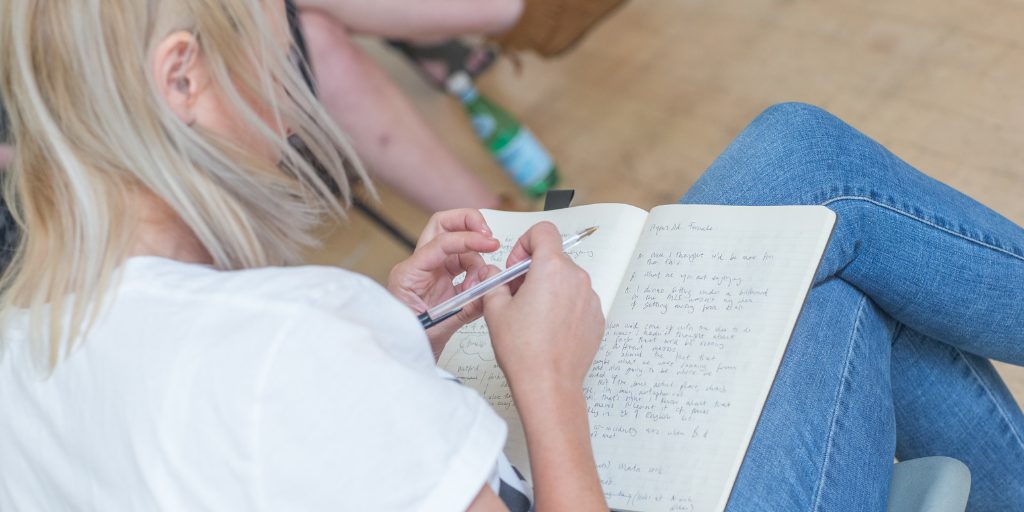
In the lead up to Clean Break Writer’s: Here. There. Then. Now. we’ve been having many conversations on what it means to be a woman in the creative arts. After a year of stories of me too, gender pay gaps, the lack of opportunity for BAME and working-class artists and arguments concerning job shares in the West End, now seems more pertinent than ever to regroup and share our experiences.
On 7 September we’re heading to the Royal Court to hold an afternoon of discussions with Clean Break writers past and present to begin to tackle some of these problems and discuss what the future holds for women playwrights and why complicated, multifaceted representations of women on our stages are more essential than ever. In the lead up to this we caught up with some of our panellists to ask them two important questions.
The best advice I have ever received is to get rid of my smartphone - Lucy Kirkwood
The one piece of advice that helped when I began is the tried and true old chestnut - write what you know. That certainly kept me going for some time. - Jacqueline Holborough
Call yourself a writer. When people ask you what you do say "I write". Ingrain it into your identity and then write every day, no matter what. Then you are a writer. This helped me to stay focused and determined to follow my dream of seeing my work performed on stage, no matter what obstacles came into my path. – Sonya Hale
Realistically: I would like to see a much greater culture shift in terms of the consideration we give to childcare, so that neither women or men have to choose between being an artist or being a primary care giver.
Unrealistically: I would like every pre-conception we have about what is “good”, “bad” or “important” to be erased, because so much of this consensus is rooted in subconscious deference to the male canon and things that smell like it. – Lucy Kirkwood
The change I'd like to see to help women thrive has to be equal pay. Perhaps not such a problem in the theatre where we sometimes work only for love - but definitely in the television and film industries. It took me some time to realise that male writers on the same level were being paid 20 - 30% more. Maybe it's not so bad these days but fee transparency would be a start. - Jacqueline Holborough
I would like to see more groups, run by theatres helping women from minority backgrounds - different race and class - helping women to hone their skills as a writer. Then I would like to see theatres taking more of a risk to put new writer's work up on stage. It's still really hard for working class women to get their work performed because they simply don’t have the time or the money to spend learning how to write plays. It takes a lot of time and effort to write a play, how are you going to do that if you have to work long hours and bring up kids and stuff?
I think as cultural institutions, in order to encourage culturally diverse plays we have a responsibility to give certain groups a foot up into the industry. My gosh, if we don’t, we are all going to keep on watching the same middle class, vanilla culturally bland plays forever more. Plays that just reflect one set of people's take on life and that's not art. I think we are in real danger of that. - Sonya Hale
Clean Break Writer’s: Here. There. Then. Now. takes place on 7 September at the Royal Court, click here to book your ticket.

We’re recruiting new members to join our Autumn Season Programme, which begins in September!
Our Member’s Programme is available to women aged 17 and above, who have lived experience of the criminal justice system or are at risk of offending due to drug, alcohol or mental health issues.
We offer a range of programmes including; Intro to Drama, Advanced Theatre, Writers Circle and a Health and Wellbeing Group. All members will have access to our support services, travel and childcare expenses will be covered and lunch will be provided for all on the days in which you are in the Clean Break studios. Members also get exclusive opportunities including theatre trips and opportunities to take part in workshops with women who are prominent in the creative arts.
Recently our members had the opportunity to create a podcast, perform at Omnibus Theatre, work with Maria Aberg, Deborah Bruce and Sabrina Mahfouz, as well as the London College of Fashion and are currently preparing to take part in a performance at Shakespeare’s Globe.
Many Clean Break Members go on to study and work in theatre and the performing arts as performers, designers and stage managers. This year has seen four Clean Break Members take to the Royal Court stage in our most recent production Inside Bitch, and three Members are currently touring in our production of Sweatbox.
"I’ve gone from not really knowing what creativity was, to discovering my own creative process – learning things as simple as what time of day is best to write, and where I get my ideas from. Now I know I’m an incredibly creative woman, and I have the tools to access that creativity and manifest it."
Sonya Hale, Playwright and Clean Break Member
If you are interested in becoming a Clean Break Member you can contact us directly or if you have a key worker a referral can be made for you.
You can call us on 020 7482 8600 or email participation@cleanbreak.org.uk. We look forward to hearing from you!
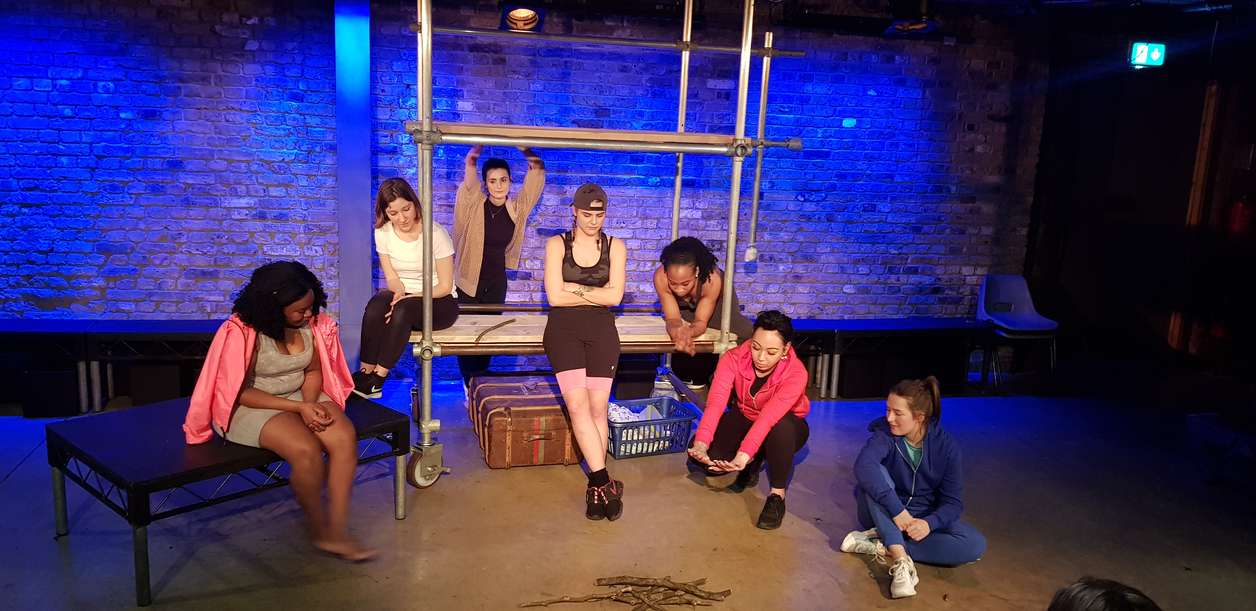
Are you a performer aged 17 – 30?
Do you want to develop your performance skills and create your own work?
Do you have experience of the criminal justice system?
If this describes you, then our Young Artists Development Programme could be the opportunity you’ve been looking for.
This specialist programme is for young women aged 17 – 30 who have experience of, or who are on the fringes of the Criminal Justice System and want to develop their acting skills and gain an insight into the creative industry. The programme takes place over a year focusing on nurturing and supporting new talent and giving a platform to underrepresented artists, with a view to creating original work.
Following an extremely successful programme last year we are extremely excited to invite six more young women to join Clean Break and learn from some of the best female artists in the theatre industry. During a nine-month intensive programme you will participate in a variety of masterclasses, perform in a new play that raises issues of young women and incarceration and work on an independent project creating your own show, all while being mentored by industry professionals. A theatre and book allowance are also provided to supplement your professional development.
Clean Break is committed to dismantling barriers to engagement in the arts and therefore this programme is free of charge. In addition, lunch and travel expenses are covered. All we ask is that you commit to one day of rehearsal per week, with the possibility of extension during rehearsal periods.
“It has totally changed my confidence. It’s always been something I struggle with, and the independent project in particular has really stretched my confidence. I’ve had many times when I felt like I wanted to cancel it or I couldn’t do it, but I’m doing it anyway which I think says a lot about how my confidence has improved… I’ve now got three very close friends for life in the other young women - really a new family. It’s been amazing.”
Young Artists Development Programme Member 2018 – 2019
Applications for the Young Artists Development Programme 2019 – 2020 are now open! If you’re looking to take the next step in your career, then please click the link below and complete the application. We can’t wait to meet you!
Closing date: 12:00 pm on Tuesday 10 September
If you have any questions about the programme, or your eligibility to apply, don’t hesitate to give us a call on 0207 482 8600 or email participation@cleanbreak.org.uk.
Click here to apply for the Young Artists Development Programme 2019/20
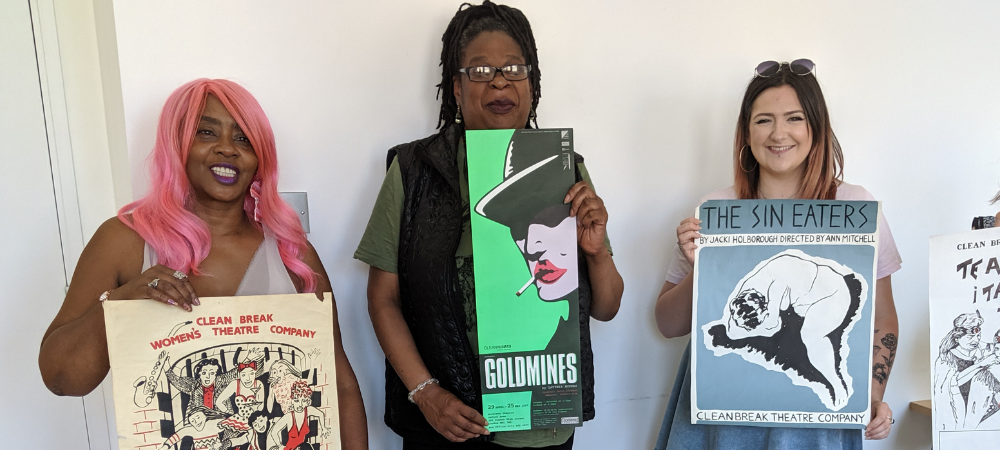
To mark Clean Break’s 40th Anniversary, we are delighted to be working with the Bishopsgate Insitute to create an archive of Clean Break’s work, to document the history of our organisation and make it publicly accessible for the first time.
For us the Clean Break archive presents a unique opportunity to study the history of women in criminal justice, feminist activism and alternative theatre in the UK in the 20th Century. Our mission is to bring the hidden stories of imprisoned women to a wider audience, and we hope that the stories in the archive will continue our work to inspire playwrights, captivate audiences and fuel research on the complex theme of women and crime.
We have been working with Clean Break Members and community volunteers to explore the contents of our archive on-site, and will be collecting oral histories from our founders, staff and members past and present. Bringing together these women, we are working as a team to explore the archive with each woman bringing a unique experience and hope for what they want to achieve from the process. Each day the Archive Team have been inspired by what we have uncovered, some highlights so far have included; postcards created on International Women’s Day 2007 which included drawing, poetry and personal opinions from clean Break Members, original posters from productions as early as Sin Eaters and folders of lesson plans from our old education programme.
As part of the project the team visited the Bishopsgate Institute, and were treated to a tour of their archives by Special Collections and Archives Manager, Stefan Dickers. One member stated;
“What insight into how varied and interesting archiving can be – it whetted my appetite to discover more about Clean Break’s history. I also noted the “Harass Your MP” T-Shirts by the Stop the War coalition – which was so relevant to our Clean Break Mass Lobby of Parliament with Women in Prison to reduce the number of women in prison”
We asked the Archive Team what their hopes for the future are from looking at the past, their answers highlighted the importance of undertaking a project which looks in such detail at the past in order to influence the future, these included;
“That more organisations can look to Clean Break as a model of how to change lives.”
“I Have been accepted to do qualification in Archiving at UCL and hope this will help put theory into practice.”
“I hope I can refresh my mind. If ever in doubt that it’s okay to feel the way I am feeling, and it will pass. And with the tools I have picked up along the way anything / everything is possible”.
As well as setting up an archive at Bishopsgate, we will be creating a touring installation inspired by the archive that will tour alongside Sweatbox from September 2019, working with designer Miriam Nabarro, supported by Clean Break Member Liz Whitbread to transform the prison van into a space where you can explore some of Clean Break’s history.
Claire Stone, Heritage Project Manager commented, “In 1979 Clean Break was established by two brilliant women who refused to let prison silence them. We are delighted to be working with our Members, volunteers, artists and the Bishopsgate Institute to share the story and legacy of Clean Break’s work, and how it continues to tell inspirational and challenging stories about women and justice today.”
We’d like to thank our partners the Bishopsgate Institute and National Lottery Heritage Fund for making the Clean Break Archive possible.
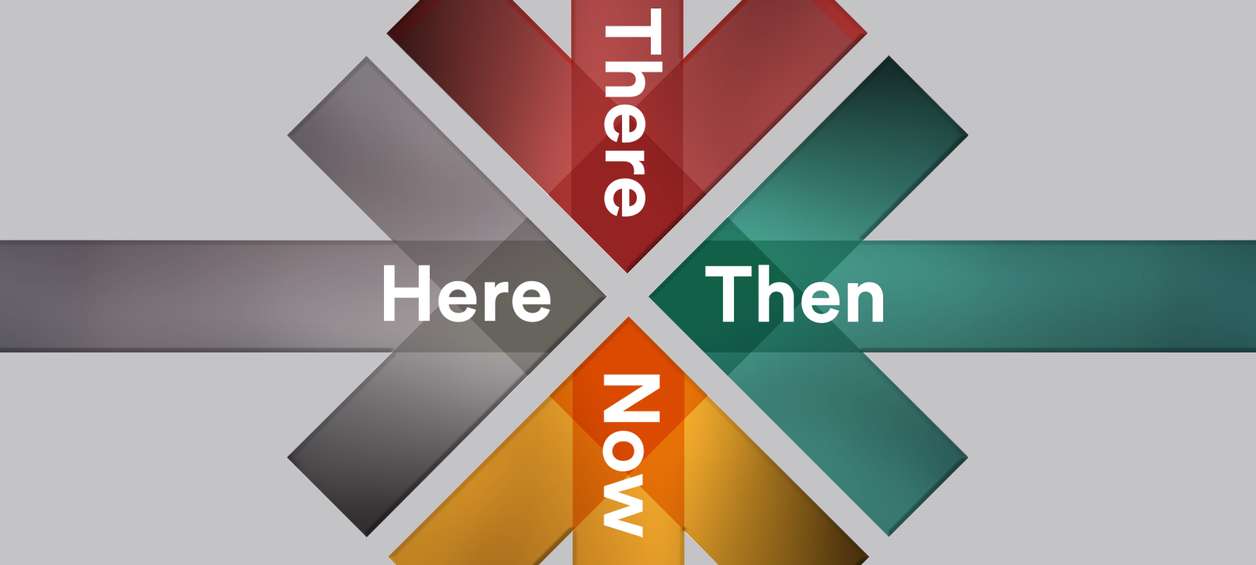
For forty years we have produced ground-breaking plays by some of Britain’s best playwrights. We've gathered a selection of these progressive, brilliant artists come together to share what they have learnt from working with us, what the future holds for women playwrights and why complicated, multifaceted representations of women on our stages are more essential than ever.
Clean Break's Writers: Here. There. Then. Now. is hosted by Jane Fallowfield and Paulette Randall, with guests Stacey Gregg (co-creator, Inside Bitch), Tanika Gupta (Inside Out), Sonya Hale (Blis-ta), Jacqueline Holborough (Co-Founder, Clean Break and writer of Killers), Lucy Kirkwood (it felt empty when the heart went at first but it is alright now), Tash Marshall (Clean Break Writer in Residence 2018) Winsome Pinnock (Mules), Rebecca Prichard (Yard Gal), and Somalia Seaton (House).
Anna Herrmann, Joint Artistic Director commented:
‘‘We are thrilled to be convening this special event as part of our 40th Anniversary Year, drawing together a selection of inspiring, brilliant Clean Break writers, hosted by the Royal Court, which has been a home to us many times over the past four decades. We look forward to hearing the reflections of our writers and sharing a conversation about the future of theatre in terms of voice, gender and representation.’’
Clean Break’s Writers: Here. There. Then. Now. is part of a series of events presented as part of our 40th Anniversary Year, which launched with Inside Bitch at the Royal Court Theatre with further highlights including the publication of Rebel Voices – Monologues for Women by Women (published by Methuen Drama), Chloë Moss’ Sweatbox, touring the UK in a prison van, and [BLANK] by Alice Birch, a Clean Break and Donmar Warehouse co-production (premiering at Donmar Warehouse in October).
Supported by Queen Mary University London and with thanks to the Royal Court.
Click Here to Book Your Ticket
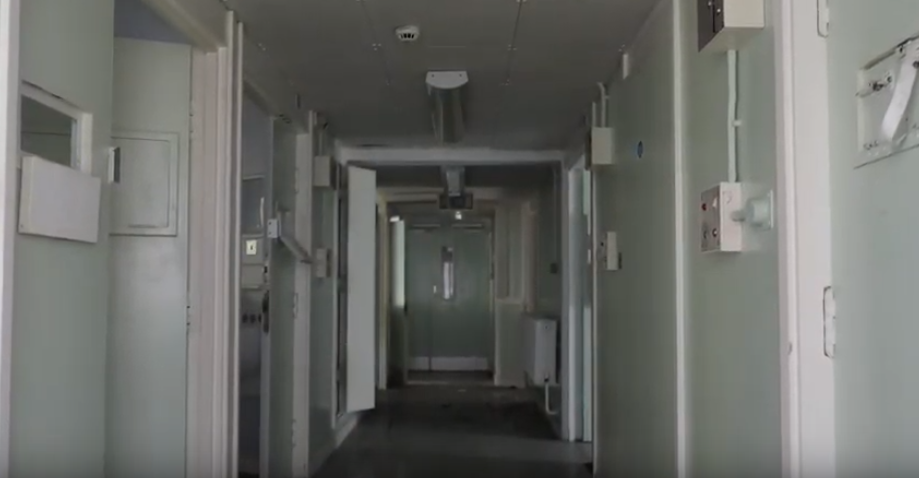
In 2016, over one hundred years after it first opened its gates, HMP Holloway said goodbye to its last female prisoner and closed the final chapter of a famously controversial history. It has since been sold for over £80m and will be levelled to make way for 1,000 new affordable homes. Until redevelopment begins, HMP Holloway remains a scar of the North London skyline, a reminder for many of a justice system which maligned and failed women. Within its now deserted corridors remain fragments of stories which will soon be lost to history, but which remain very much alive for the women who were once held there.
Earlier this year, five Clean Break Members who each served time in HMP Holloway, envisioned such possibilities in a collaborative short-film project with documentary film maker Clare Richards. Part of the London Festival of Architecture (LFA) and created by Ft’work in collaboration with Sarah Wigglesworth Architects, Without Walls explores the experiences of our Members in Holloway, the impact it has had on their lives and the tensions caused when social and physical boundaries collide. Giving a voice to those who are often marginalized and silenced by society, the project sought to involve women in the conversation surrounding penal reform and asks them to share their own ideas about how our criminal justice system could better support women who offend.
In a series of hard-hitting, poignant, and at times funny conversations, Members discuss the harsh realities of prison life; from the claustrophobia of confinement in shared cells, antagonistic staff, nauseating sounds, daily stampedes just to get clean and the debilitating effects that prison has on a person’s state of mind. Each woman shared the sentiment that confinement within prison has far more detrimental affects than positive, and that alternative rehabilitative systems must be put in place.
So, what is the alternative? Our Members, and other advocates for reform, such as Women in Prison, and the Prison Reform Trust, pose women’s centres as the logical answer. Women’s centres are a sensitive and holistic approach to rehabilitation, providing support for mental health, substance abuse, domestic violence, and employment to break the cycle of deprivation and offending. A 2015 report by the Ministry of Justice found that rates of re-offending were reduced among women who had been given the support of a women’s centre, versus those who had not, while an impact study conducted by the Centre for Welfare Reform, discovered that all participants felt an improvement in their lives as a whole.
The case for women’s centres is clear. Holistic, trauma-informed approaches to female offending have far more positive results than our current carceral system. Yet with only 50 centres of this kind in the U.K, more investment is needed to ensure vulnerable women get the support they deserve. Women in Prison’s #OPENUP campaign is calling for the reduction of the women’s prison population and the creation of healthier, safer communities for all.
You can find out more about the Clean Break Member's programme here.
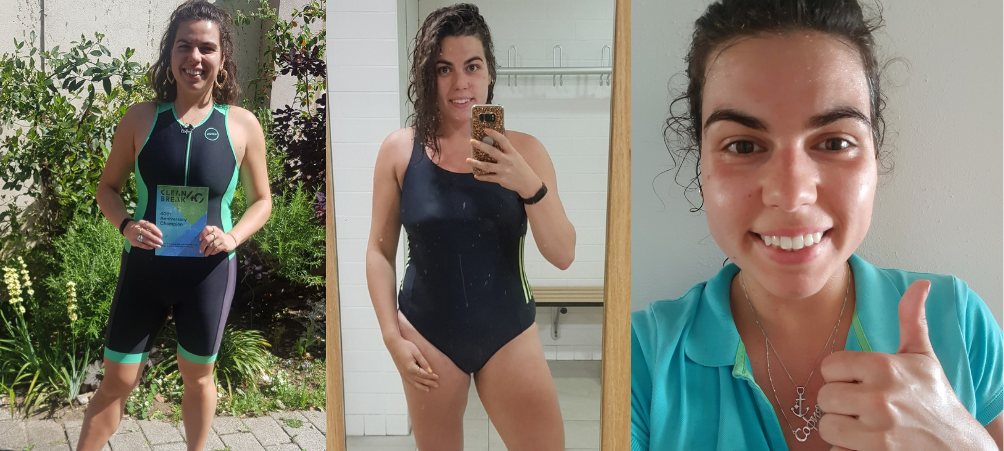
On the blog this week our Assistant Producer Dezh Zhelyazkova shares her reasons taking on the London Triathlon in order to raise money for Clean Break.
As Clean Break celebrates 40 years of ground-breaking work, I chose to take part in the London Triathlon to fundraise for it.
This year Clean Break supporters are taking part in 40 challenges to raise money for our organisation and I have been looking for an impactful way to take part, motivated by the remarkable results of the company’s work with its members and the lasting mark it leaves with audiences, day after day. As a charitable organisation, I acknowledge that Clean Break would make good use of any support it receives, especially in its action-packed anniversary year, and I am thrilled to be contributing to it with my pledge to raise £1000 as part of this campaign. My biggest motivation lies in my admiration for Clean Break Member's and the amazing strength, talent, and wit they bring to everything they do.
While I am confident in all triathlon disciplines on their own, and have competed in several swimming and running events, taking part in a triathlon is a new challenge for me. It started as a joke, when after competing in a swimming event last November, a friend of mine suggested I take part in a triathlon. I was already set to be running at a half marathon race in March, but I decided I would look for an even greater challenge and create an even more impactful fundraising campaign. I have chosen to complete the Olympic Westminster distance event of the London Triathlon, which consists of a 1.5k swim at the Royal Victoria Dock, a 40km cycle from the ExCel Centre to Westminster and back (plus a smaller lap to Billingsgate) and a 10k run back at the London Docklands. I am ecstatic to be taking part in such a grand sporting event and joining thousands of athletes on this iconic route.
Taking part in London Triathlon requires numerous personal sacrifices and lifestyle adjustments but it is all worth it as I channel my appreciation for Clean Break, and the motivation to perform my best at the largest triathlon in the world.
Steph Cartwright, our Philanthropy Manager commented:
“Clean Break is extremely proud and grateful for Dezh’s support in doing the London Triathlon. Challenges are a fun and easy way to get involved with your charity, to show your support. The more people who complete a challenge for us will spread our message to new people we haven’t had a chance to meet yet. Clean Break can’t wait to see Dezh at the finish line!”
You can find out more about taking on a challenge as part of our 40th Anniversary celebrations here.

Last week marked the halfway point of our year of celebrations for our 40th Anniversary, and what a week it was. We’ve rounded up the whirlwind of activity to make sure you didn’t miss any Clean Break action.
We joined Women in Prison on Wednesday 26 June for their Mass Lobby of Parliament to mark one year since the publication of the Ministry of Justice’s ‘Female Offender Strategy’. The Lobby called on supporters of the strategy, which seeks to reduce the women’s prison population, to meet en masse at the Houses of Parliament and raise the importance of the campaign with their local MP. Women’s organisations from across the UK rallied together calling on their MP’s to increase investment (especially funds generated by the £80m sale of HMP Holloway) and support for Women’s Centres, and examine circumstances surrounding female offending. The day was a great success, with many MP’s including Dianne Abbott and Vicky Foxcroft pledging to support the campaign in parliament.
After the Mass Lobby, staff and Members continued the day at Rich Mix in Shoreditch for a screening of Without Walls, a short film created by Ft’work in collaboration with Clean Break and Sarah Wigglesworth Architects for The London Festival of Architecture. Poignant and compelling (we’re not being biased, it’s true!), the film explored the theme of boundaries, and, in the case of our Members, confinement. Five women described their experiences in stark detail, discussed the importance of Women’s Centres, and their ideas about alternatives to imprisonment. Set to haunting images from the now deserted HMP Holloway and illustrations from a former resident, Without Walls is a remarkably unique piece of storytelling.
Gender, Justice and Women’s Rights; Change, Progress and the Future was an inspiring event of lively discussion from Deborah Coles (Director, INQUEST) and Sonali Naik QC, both exceptional leaders in their respective fields. The event was hosted as part of the #FlyTheFlag70 celebrations which mark the 70th anniversary of the Universal Declaration of Human Rights. These two inspiring women detailed their ongoing efforts to effect women’s rights and penal reform in the age of austerity, where achieving fairness and equality seems like a never ending, but ever important battle. Over 10 years since the Corston report it’s a sad fact that very little has changed in women’s prisons. Yet the presiding message of Gender, Justice and Women’s Rights was hopeful; we must hold on to the change that has happened and continue to create it together.
Sometimes to influence change you must cause a stir. Our current production Sweatbox, written by Chloë Moss seeks to do just that, bringing audiences into the cramped, claustrophobic conditions of a prison van as three women share their stories of arrival, survival and anticipation. Audiences arrived at Clean Break on Friday and left with some serious food for thought. You can still catch Sweatbox at Snape Maltings, Suffolk, on 24 August and Orbit Festival on 19 September.
We’re halfway through the year, but don’t fear, we still have six months packed full of activity to celebrate 40 years of Clean Break. Click here to find out what’s happening over the next 6 months.

On Wednesday 26 June we will be joining Women in Prison’s mass lobby to mark one year since the publication of the Ministry of Justice’s Female Offender Strategy.
Attendees will be lobbying their MPs, asking them to make a commitment to; investing in, growing and supporting a specialist network of women’s centre’s, that enable women to address the root causes of offending in a supportive, non-judgemental environment. They will also be focusing on the need for £80m that our HM Treasury has received from the sale of the Holloway prison site to be invested into the delivery of the strategy.
Women in Prison will be using the Emmanuel Centre as their base for the day where there will be information and stalls about campaigns and organisations who work with women with experience of the criminal justice system. The day will culminate in a rally at 4pm, which will see several speakers including representatives from the Ministry of Justice.
If you’d like to find how your can get involved in the day, or how to lobby your MP click here for more information.
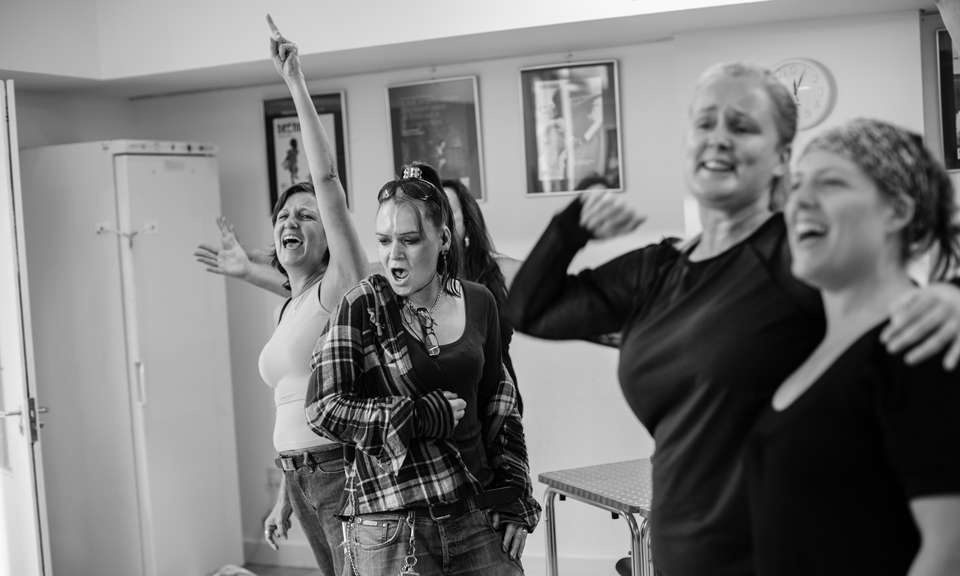
Ella an Unlocked Graduate joined Clean Break on a work placement, to celebrate Volunteers Week she wrote a blog for us about her experience.
It is not often you walk into a work space and feel immediately welcomed, but the moment I began volunteering with Clean Break I was introduced into the environment with an incomparable warmth and openness. As both a work environment and a centre for creative expression Clean Break presents a safe space that supports and drives both its members and staff. The organisation runs as a well-oiled machine yet allows space for emotion, humanness and humour to be shared. The unwavering commitment that Clean Break has towards it members was inspiring and a world away from the treatment I am witness to every day in my work place.
I have spent the last 20 months completing a graduate placement working frontline in a women’s prison. It was only until I came to volunteer at Clean Break, and saw a functioning example of rehabilitation, that I realized just how dismal and damaging the current prison system’s approach is for women. The services available for women in prison are inaccessible and uninspiring, yet it is charities such as Clean Break that provide a glimmer of hope in a repressive and failing system. During my placement here I was able to observe just how transformative providing women with creative expression and a holistic safe environment can be, I have witnessed the devastating effects that the criminal justice system can have on women’s lives but during my time at Clean Break I was able to see women, who have experienced this system, heal from some of those effects and have space to tell their stories.
The women who I work with everyday have been robbed of their voices, if prisons are to provide sufficient care we need to begin to acknowledge and give centre stage to these women’s narratives. Working with Clean Break allowed me to re-configure my outlook towards my everyday work which had become defeatist and pessimistic, I was reminded of the power of the creative and the strength that a collective group of women determined to create change can exude. I have gone back to work with renewed energy, striving to emanate the hopeful and determined drive of the Clean Break Members I worked with, taking back with me both a restored faith in the potential to change a failing system and the fight to provide women in prison with creative and restorative spaces. The connection between Clean Break and the female establishment is key to this fight and I will strive to raise awareness among the women in prison about the possibilities available to them.
It was refreshing to be part of a workforce who care for each other and strive for a joint ethos and vision, the unity among staff is testament to the care provided by management. The effective management at Clean Break made me acutely aware of the lacking welfare support and management I, and most other prison staff alike, have experienced. This is a topic which is close to my heart and one I am currently writing policy to try and change. The Members team at Clean Break made it clear that their Members are continuously the priority but had a crucial understanding that the only way Members can be prioritised is with a workforce who themselves are cared for and confident.
I knew prior to volunteering just how professional and visionary Clean Break is as a theatre company, you simply have to look at past productions to know this, however it was the everyday running of the workshops that demonstrated to me just how adept this charity is at running a trauma informed safe space for women to meet fellow creatives and explore their own narratives.
The highlight of my work placement with Clean Break was witnessing their celebration of International Women’s Day 2019 which was a chance for both staff and Members to come together, share food, stories, music and inspiration. This moment allowed me insight into the gratitude people felt towards the organisation and the strength that flourishes through creation.
Would you like to volunteer at Clean Break? Find out more about our volunteering opportunities here.
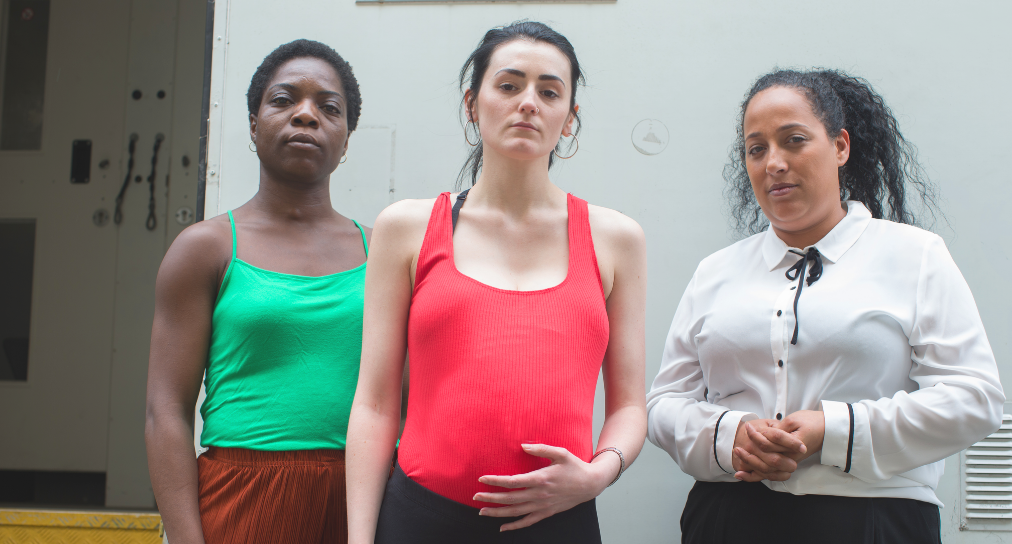
The 2019 revival of Chloë Moss’s Sweatbox will star three Clean Break Members - Funke Adeleke (On Missing, Cockpit Theatre) Jade Small (Sweatbox original cast member, Inside Bitch, Royal Court Theatre) and Posy Sterling (Belong, Arcola & Lyric Hammersmith).
From June onwards, Sweatbox will be touring the UK accompanied by a mobile exhibition created by artist Miriam Nabarro, celebrating 40 years of Clean Break’s work. For full tour dates and an opportunity to book, please visit the production page. Congratulations to our three Members who began rehearsals this week - break a leg!

From a 5k run to a sponsored silence, we are looking for people who would like to help raise money for Clean Break to mark our 40th Anniversary year. Challenges are a great way to push yourself whilst supporting the work that we do, whether it’s a fitness goal or you’re looking to give something up, why not give yourself the extra incentive by raising money for Clean Break?
If you do decide to complete a challenge for us, you’ll not be alone, many of the Clean Break staff have already signed up, started training and raring to complete their challenge. Our Assistant Producer Dezh has taken on the incredible challenge of the London Triathlon, Westminster Olympic Distance. This consists of a grueling 1500m swim, 40km bike ride finished with 10km run. Her training journey and race day will be recorded on the London Triathlon website and social media channels, so keep an eye out for pictures, blogs and videos tracking her journey.
Other members of staff have signed up to run a 10K race and one will even be completing a sky dive, we will be sharing their training journey every step of the way, so make sure to keep an eye on our Twitter.
Supporting Clean Break through a sponsored challenge helps us to spread the word about what we do and, allows us to reach more women with experience of the criminal justice system who would benefit from becoming a Clean Break Member. So, if you fancy taking up a challenge, lets work together to change hearts and minds!
If you would like to get involved in a challenge and would like to represent Clean Break please contact Stephanie.cartwright@cleanbreak.org.uk or call 020 7482 8651. We will provide you with a sponsorship pack and support along your journey.
You can find out more about Clean Break and the work we do here.
#CleanBreak40